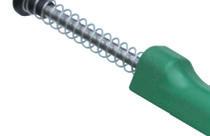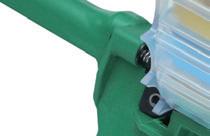


From Fife fields to global hockey field





From Fife fields to global hockey field

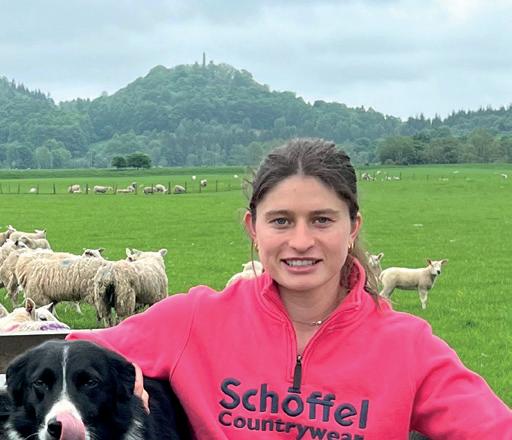
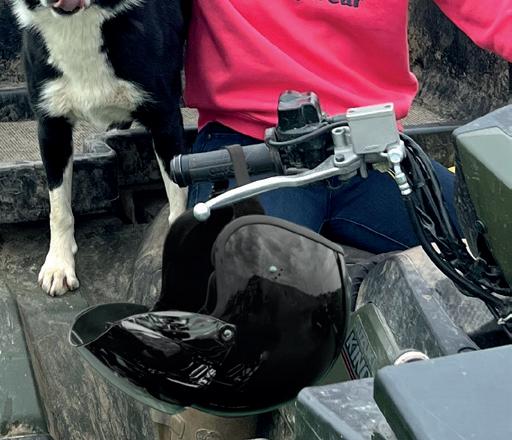

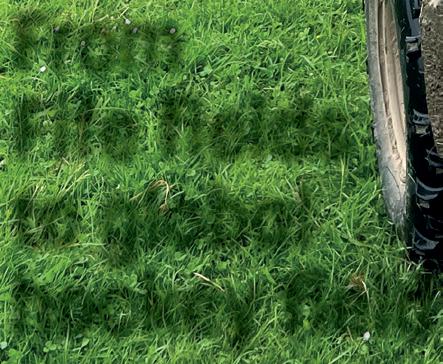

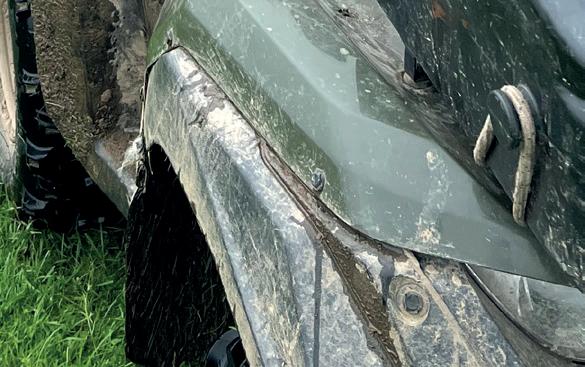


To find out how we can protect what matters most to you, search ‘NFU Mutual Farming’ or contact your local agency

Covering small farms, large farms and everything in between.
Provided by NFU Mutual Agents, located in rural towns and villages throughout the UK.
Expert advice to identify the health and safety dangers facing your farm and provide personalised solutions for everyone’s safety.

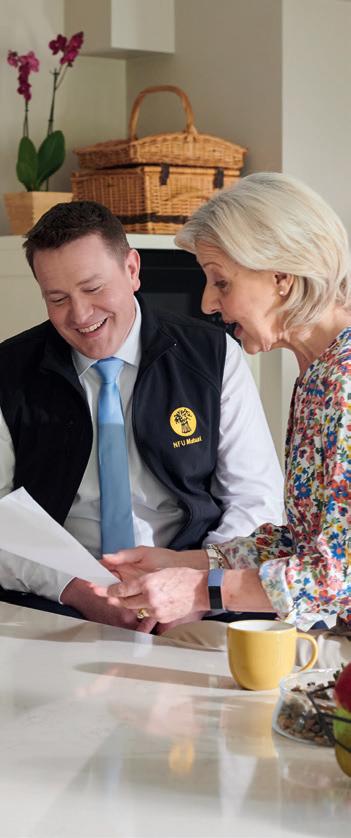
From pensions to investments, life cover to business protection, we’ve been helping customers with their financial planning needs for 95 years.
NFU Scotland, Rural Centre, West Mains
Ingliston, Edinburgh EH28 8LT
NFU Scotland, Rural Centre, West Mains Ingliston, Edinburgh EH28 8LT
NFU Scotland, Rural Centre, West Mains



Ingliston, Edinburgh EH28 8LT
Tel: 0131 472 4000 www.nfus.org.uk nfuscotland @NFUStweets

0131 472 4000 www.nfus.org.uk nfuscotland @NFUStweets @nfuscotland
Editor Diana McGowan editor@nfus.org.uk

HTel: 0131 472 4000 www.nfus.org.uk nfuscotland @NFUStweets
OW often do you see or learn about something and think ‘I’m up for that’, but then never actually realise that positive thought/ silent commitment? Possibly too often or not at all.
Design & Production
Editor Diana McGowan editor@nfus.org.uk
Mark Shreeve mark.shreeve@micropress.co.uk
Managing Editor

HOW often do you see or learn about something and think ‘I’m up for that’, but then never actually realise that positive thought/ silent commitment? Possibly too often or not at all.
Craig Gibson
Andrew Hirst andrew.hirst@micropress.co.uk
Advertising Sales
Design & Production
Editor Diana McGowan editor@nfus.org.uk
Ryan Swinney
Danny Lewis 01502 725862 danny.lewis@micropress.co.uk
In this month’s magazine, our two features cover inspiring stories and highlight just how rewarding delivering on such thoughts can be both for the individual involved and others who may benefit along the way.
IAdvertising Sales
Diana McGowan
Managing Editor
Craig Gibson
Mark Tait 01502 725803 mark.tait@micropress.co.uk
Clare Stebbing clare@connect communications.co.uk
In this month’s magazine, our two features cover inspiring stories and highlight just how rewarding delivering on such thoughts can be both for the individual involved and others who may benefit along the way.
Design & Production
Tel: 0131 561 0024
Ryan Swinney
Published on behalf of NFU Scotland by COUNTRYWIDE PUBLICATIONS
Fountain Way, Reydon Business Park, Reydon, Suffolk IP18 6SZ 01502 725800
Advertising Sales
Published on behalf of NFU Scotland by Connect Publications (Scotland) Ltd.
Printed by MICROPRESS PRINTERS LTD
Clare Stebbing clare@connect communications.co.uk
Studio 2001, Mile End, 12 Seedhill Road, Paisley PA1 1JS
Tel: 0131 561 0024
Fountain Way, Reydon Business Park, Reydon, Suffolk IP18 6SZ 01502 725800
Published on behalf of NFU Scotland by Connect Publications (Scotland) Ltd.
Studio 2001, Mile End, 12 Seedhill Road, Paisley PA1 1JS
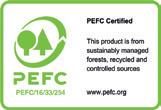
We’re only a few weeks away from the Royal Highland Show. Over the course of four days, thousands will flock to the show to compete, judge, exhibit, organise, educate and socialise. We’ll see the best of the best and relish the atmosphere. Among the highlights and away from the main show ring, this year will see the welcome return of the Golden Shears Sheep Shearing and Woolhandling World Championships. Taking place at the MacRobert Theatre, the 2023 Worlds will see more than 30 countries compete for the prestigious title and it promises to be an action packed showcase of the art, skill and techniques required to be a world champion. Perhaps a less well known event taking place at this year’s Highland is the final qualifying round of the 2023 Britain’s Fittest Farmer competition. Taking part in this event for the first time is Kyla Graham from Kirkcudbrightshire. Kyla first spotted the event at the Show last year and while watching it thought ‘I’m up for that’. Kyla knew however she couldn’t just enter there and then. Like any competition, she understood you need to be ready for it and without knowing if she would even enjoy it, she set her mind to it to finding out if she would. Kyla shares her journey from that moment to the present and highlights how she’s benefited already in so many ways both mentally and physically, and explains about the positive impact her preparation has had on her working life.
t was great to see so many of you over a busy few days at the Royal Highland Show in June. The shared NFU Scotland and Mutual stand was buzzing with chat and laughter each day (and not just when the strawberry tarts were being served)! I particularly liked hearing your thoughts about the magazine, what you like, miss or enjoy the most. Your feedback is important and much appreciated. Thank you also to those who happily let me take your photo – maybe you’ll spot yourself in the gallery of images on pages 16-22 as we capture a flavour of this year’s event.
On the eve of the Royal Highland Show the landmark Agriculture and Rural Communities (Scotland) Act 2024 was passed by the Scottish Parliament. On pages 35-36, our Director of Policy, Jonnie Hall, highlights what the new powers of the Bill mean, the opportunities they present and the key milestones that everyone needs to prepare for.
Elsewhere we reflect on what the new political landscape in Westminster means and how we will be engaging with the new cohort of MPs in the short-term. We also share an update of our political engagement prior to the election on pages 14-15. Catch up on that plus the latest news, regional and policy activity throughout this issue.
We’re only a few weeks away from the Royal Highland Show. Over the course of four days, thousands will flock to the show to compete, judge, exhibit, organise, educate and socialise. We’ll see the best of the best and relish the atmosphere. Among the highlights and away from the main show ring, this year will see the welcome return of the Golden Shears Sheep Shearing and Woolhandling World Championships. Taking place at the MacRobert Theatre, the 2023 Worlds will see more than 30 countries compete for the prestigious title and it promises to be an action packed showcase of the art, skill and techniques required to be a world champion. Perhaps a less well known event taking place at this year’s Highland is the final qualifying round of the 2023 Britain’s Fittest Farmer competition. Taking part in this event for the first time is Kyla Graham from Kirkcudbrightshire. Kyla first spotted the event at the Show last year and while watching it thought ‘I’m up for that’. Kyla knew however she couldn’t just enter there and then. Like any competition, she
Away from elections, it seems every TV or news channel of late is focused on sport – tennis, football, rugby, cycling and golf. Scotland seems to keep producing a wealth of home-grown talent that excel on a European and/ or Global stage. In this issue, we focus on Katie Robertson’s journey to hockey success. Katie who hails from a farm in Fife, has now represented GB and Scotland at two different sports. She will shortly be taking part in European Qualifiers taking place in Glasgow this month. You can read how she balances competitive sport and farming on pages 46-49. Good luck, Katie.
On a completely opposite end of the sporting ability but in the pursuit of raising as much money as for the RSABI charity as possible, I have signed up to do the Great Glen Challenge on 30 August. I am going to be doing the 49km cycle stretch for this team event. If you are able to sponsor the NFU Scotland teams that would be great. Read page 8 to find out how.
Finally, I am honoured to have been awarded a bursary by the British Guild of Agricultural Journalists via its Joe Watson Legacy Fund. This will enable me to attend the International Guild of Agricultural Journalists Conference in Switzerland this August. I’m looking forward to reporting back on the adventure in a future issue.
The other feature looks at how a casual conversation during a Christmas lunch turned into the most rewarding and humbling experience for Next Generation Chair, Matthew Steel, one of the many volunteers who have recently delivered much needed 4x4 vehicles to Ukraine to support the war effort. Matthew explains his contribution to the ‘Pickups for Peace’ campaign and reflects on how the unexpected reception received from the Ukrainians has impacted him and those who were involved. Finally, as we head towards the longest day, with the hope of some warmer weather on the horizon, I hope you’re remembering to dress for the weather and wear protective sunscreen and hat when you’re out and about. The strength of the sun even on a dull day can prove harmful if exposed without protection. If you need a new baseball cap, visit the NFU Scotland website and purchase one from the branded merchandise in the Members’ Benefits section.
DIANA McGOWAN, Editor, Scottish Farming Leader
The other feature looks at how a casual conversation during a Christmas lunch turned into the most rewarding and humbling experience for Next Generation Chair, Matthew Steel, one of the many volunteers who have recently delivered much needed 4x4 vehicles to Ukraine to support the war effort. Matthew explains his contribution to the ‘Pickups for Peace’ campaign and reflects on how the unexpected reception received from the Ukrainians has impacted him and those who were involved.
Keep up to date with all the news on Facebook or follow us on Twitter @NFUStweets
For the weekly news sent to your email, please send your name and membership number to info@nfus.org.uk
“We’ll see the best of the best and relish the atmosphere”
Finally, as we head towards the longest day, with the hope of some warmer weather on the horizon, I hope you’re remembering to dress for the weather and wear protective sunscreen and hat when you’re out and about. The strength of the sun
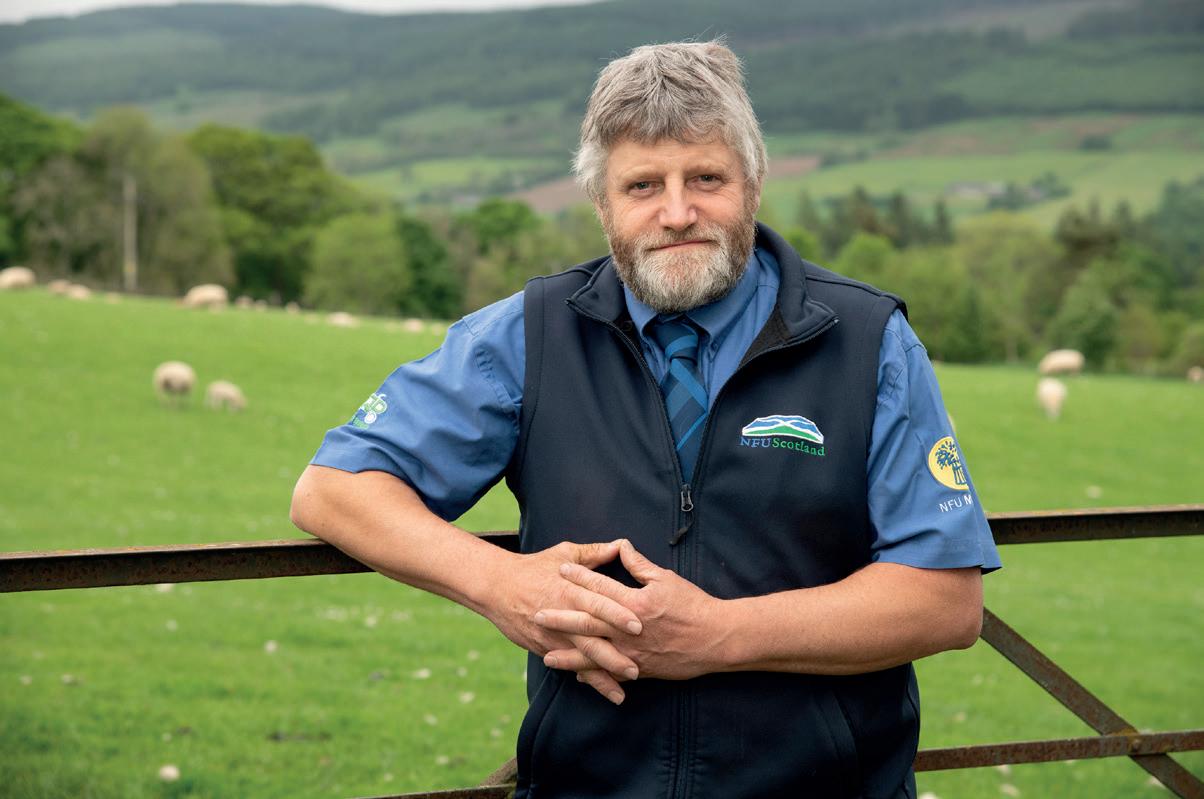
So, the election is over and to a degree no real surprises with the result, albeit slightly more emphatic than expected by some. Now we know the results it is vitally important that we engage with the new Government and MPs at every opportunity. Labour know full well what our asks are through our own manifesto, but their commitment, particularly from a funding point of view has been extremely lacking in detail. We will immediately look to arrange numerous meetings with the new administration in Westminster and I’m sure as you read this we will already have travelled south to make sure Scotland’s voice is heard in what will defi nitely be a new look House of Commons.


For
From a Labour Government’s point of view, having won the election with such a majority is something to shout about from the top of the trees. That said, this also gives them the ability to do what they want in Westminster without signifi cant challenge. That’s exactly why, given the likelihood of a change in power, over the past eighteen months or more we had continued our engagement Keep
with all political parties including Labour politicians with the likes of the Shadow Agriculture Minister Daniel Zeichner MP, who has now just been appointed Minister of State for DEFRA. This I am hopeful will now pay dividends in terms of
What
inevitably won’t just aff ect Westminster. With Labour going from two MPs in Scotland to 37 and the SNP going from 45 to 9, I’m sure despite the great rhetoric of working together across the chamber in Edinburgh with a new
we will continually do is highlight the fact that regardless of party, if you are elected as an MP in Scotland you should not simply toe the Westminster Party line, you’re priority is to the people of Scotland.
us already having a good dialogue that we can now build on. What we will continually do is highlight the fact that regardless of party, if you are elected as an MP in Scotland you should not simply toe the Westminster Party line, you’re priority is to the people of Scotland. Given how important farming and crofting is to Scotland from not only an economic point of view but also from an environmental and socioeconomic perspective, all MP’s must take this fully on board and fi ght the Scottish corner. However, this change
First Minister, tensions will run high in Holyrood given we are now less than two years away from the Scottish elections. NFU Scotland will continue to drive Scottish farming and crofting interests home to both Governments north and south of the border regardless of who’s in power. Sustainable profi tability will only be achieved by having a meaningful policy delivered in Scotland backed up with a meaningful budget delivered from Westminster and your Union will do everything within its power to deliver both these outcomes.

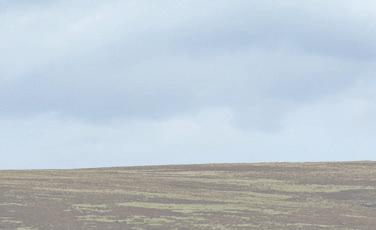

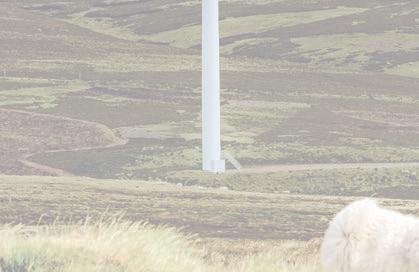









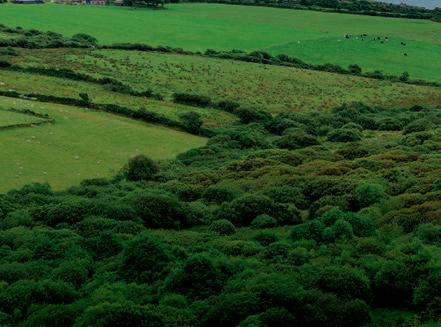




We spread crushed basalt rock on agricultural land, enriching soil fertility, supporting healthy crop growth and stabilising soil pH. This locally-sourced rock also removes CO from the atmosphere through a natural process known as enhanced rock weathering. It’s a win-win for your land and the environment.

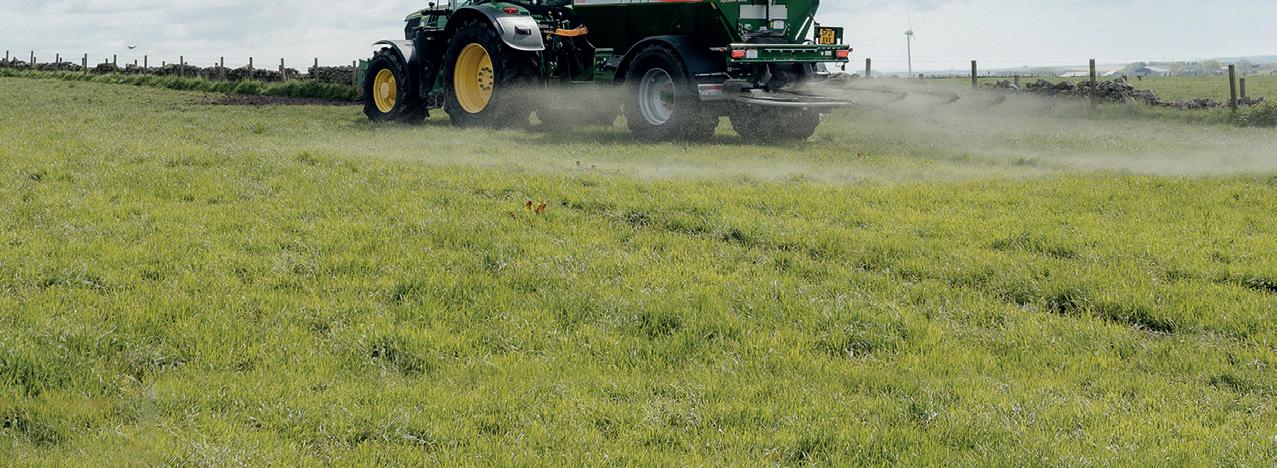
Basalt is a mineral-rich volcanic rock that has been applied as a soil amendment for hundreds of years. It’s a product of the Scottish aggregate industry which is screened to ensure it's safe for agricultural use. Our basalt is suitable for all crops, including pasture, and has been approved for use in certified organic farming systems.
Our basalt is supplied and spread free of charge or heavily subsidised, using local contractors who know the roads and the land. Farmers can expect to see the following benefits:
Nutrient uptake: Crushed basalt releases magnesium, calcium, potassium and other nutrients, boosting soil health and making your crops more pest-resistant.
Improved soil pH: As basalt weathers, it helps maintain the target pH of the soil.
Basalt delivers a slow release of alkalinity to stabilise soil pH at optimum levels for longer.
Higher crop yield: An initial trial with The University of Newcastle showed crop yield was on average 15% higher (9.3% and 20.5% between ploughed and direct drill amended plots) following the application of crushed basalt.
Farmers and landowners in the central belt of Scotland and North East Scotland.
With the help of farmers like you, our mission is to remove 1 billion tonnes of CO from the atmosphere to make the planet livable for future generations.

If you are interested in enriching your soils whilst removing
contact Joe Ritchie on 07400 858
or email joe@un-do.com.








Andrew Connon Vice-President (overseeing Food & Farming Policy)


I’m writing this after another hectic Highland Show which was packed with numerous productive stakeholder and political meetings. I also thoroughly enjoyed many conversations with members. One highlight was attending the SAYFC competitions’ prize-giving on the Saturday night. The enthusiasm, excitement and talent
displayed reminded me that our industry has a fantastic future that will be shaped by many of these young farmers. Meetings with retailers provided another opportunity to discuss key issues and it was evident our ShelfWatch campaign is starting to yield dividends.
At the end of May, we met with Morrisons to express disappointment in their decision to trial New Zealand lamb in 39 North of England stores, but also get assurances their “Market Street” butchery counters will remain 100% British.
West Fife Show and ScotSheep events were both excellent. However,
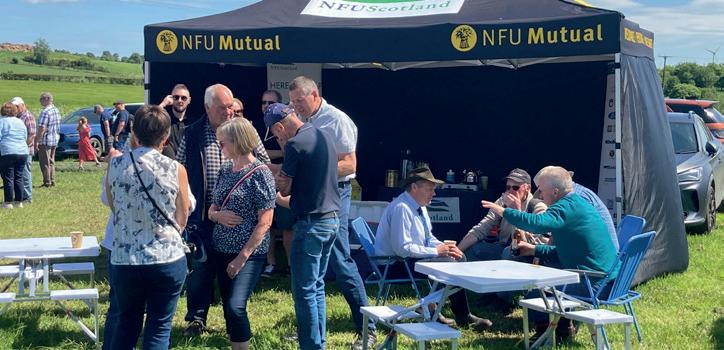




GAlasdair Macnab Vice-President (overseeing Climate, Land & Business Policy)
overnment policies on agriculture and food production are setting us on a journey. Journeys need destinations. Where are we going? Many questions needing answers. I put them to Scottish Government at NatureScot’s Highland Show reception.
Is it emissions reduction or Net Zero? With food production - maintain the status quo, reduce fertilisers and pesticides, more organic production, or more intensive production for food security?
Is it restoring the countryside to a previous landscape that supported a huge diversity of wildlife, or rewilding, relatively uncharted territory with consequences for us and nature?
New science on carbon sequestration raises more questions. Do current strategies, policies, and ambitions reflect rapidly changing scientific knowledge? Are we lagging behind science?
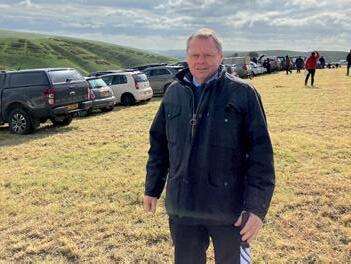
it was concerning to hear at the latter that Scotland’s ewe flock has declined by a third since 2002 with some areas of the Western Isles down as much as 65%. Following ScotSheep, I attended a meeting with the QMS Board, looking at successes, ambitions and also identifying areas for improvement.
An afternoon at the Buchan Monitor Farm with various presenters including John Gilliland talking carbon was time well spent and giving hope that we can turn the carbon story into an advantage for our farming industry.
The Angus Show, Open Farm Sunday at Bogton, Portsoy, a “Morrisons Farmers Café meeting on sustainability, hustings at Thainstone Mart, committee and monitors’ meetings were other key events in what has been a rewarding month.
Are we approaching nature incorrectly by focussing on single issues such as badgers, beavers, rewilding, intensive agriculture, woodland? Should we treat nature as an entire ecosystem, something farmers and crofters have done for centuries, working land and nature with an integrated approach?
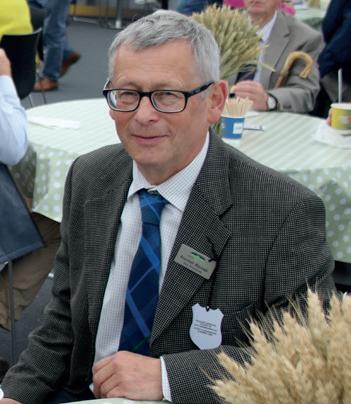



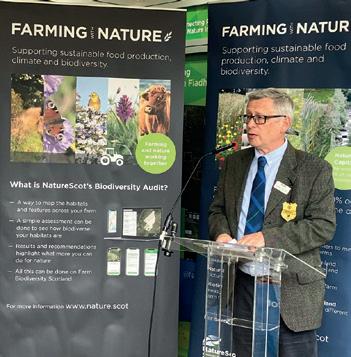
Scotland’s Biodiversity Strategy for Scotland has complex ambitions to address soil health, biodiversity, the environment and water management. We are working to ensure a simple, and easy to deliver, approach for members’ businesses, nature and society.
The journey will be underpinned by a farming industry with a long track record of delivering and over-delivering Government policy. The industry needs sustainable returns from the supply chain, economic support mechanisms that make delivery profi table and an incentivised, upskilled, trained workforce able to make land management decisions without minimal advisory input.
The only place with no destination is the wilderness.
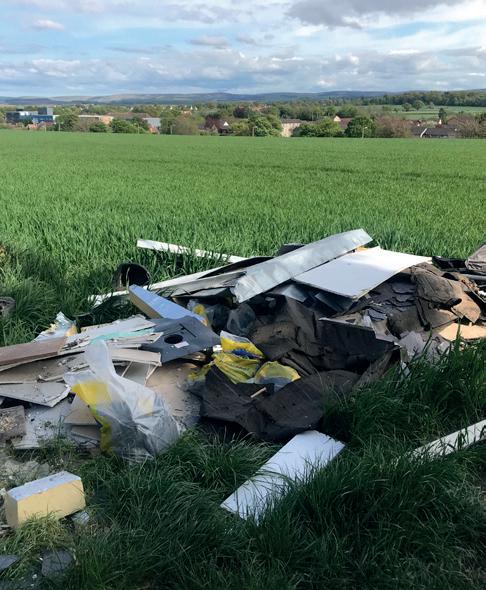
NFU Scotland is delighted that changes to the Circular Economy (Scotland) Bill mean see that farmers and crofters will no longer held liable for clearing up waste that has been fl y-tipped on their property. The Bill means that a Local Authority will only be allowed to serve a notice requiring removal of waste where it is satisfi ed that the occupier, or owner, of the land deposited, or knowingly caused or knowing permitted the waste to be deposited.
Other legislative changes in the Bill, include increased liability on the generator of the waste, increased levels of penalties and a requirement to for Local Authorities to gather data on locations, frequency of fl y-tipping and number of fi xed penalty notices served.
We will continue to engage with the Scottish Government to ascertain both how waste deposited on the land of an innocent landowner would be removed and who would bear the cost. It is profoundly unfair that this cost falls on the landowner, and we welcome the changes in this Bill that starts to address this.
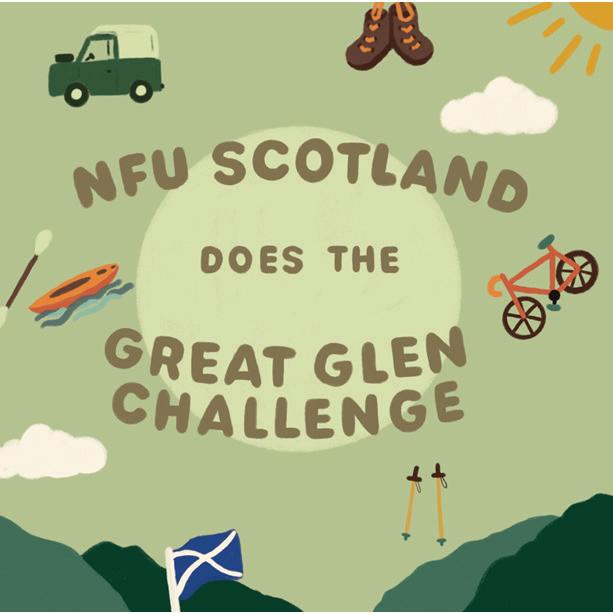

NFU Scotland is taking part in this year’s Great Glen Challenge in support of RSABI - an incredible charity which works to support people in Scottish Agriculture by providing practical, emotional and fi nancial aid. The event will once again be sponsored by our affi nity partner and legal helpline Gillespie Macandrew.
Two NFU Scotland teams, made up of willing (?) volunteers from across our Board, Regional Team and Edinburgh offi ce to walk (18km), run (17km), cycle (49km) and kayak (6km) their way from Fort Augustus locks to Fort William on the 30 August.
The Great Glen Challenge is RSABI’s biggest fundraising event of the year, and we are hoping to raise at least £2000 to help support of the amazing work this charity does. If you would like to sponsor NFUS and boost our fundraising journey, you can donate using this link https://rsabi.enthuse.com/pf/nfuscotland-a-b or by scanning the QR code above.

Editor, Diana McGowan, has been training for the cycle leg of the event by peddling to and from the Ingliston offi ce (23 mile return journey) and recently took a quick hike up a very windy Ben Lomond… just because it was there and she had a few free hours.


The 2024 agricultural census submission window has been extended to 30 August. The easiest way to complete it is online through Rural Payments and Services (RP&S).
Results of a newly published report show that in 2022 total agriculture emissions fell by 3% to 7.7 MtCO¬2e. Increased fertiliser prices as a result of the war in Ukraine may have contributed to the decrease in emissions from agriculture in 2022, as usage rates fell from the previous year. Total agriculture emissions have been in a long-term decline, largely driven by falling livestock numbers. Since the baseline period in 1990, emissions from agriculture have fallen by 12% as cattle and sheep numbers decreased by 19% and 32%, respectively. The full statistical publication with supporting data tables is available at:
Scottish Agriculture Greenhouse Gas Emissions and Nitrogen Use Statistics 2022-2023 (data.gov.scot)
Livestock Policy Manager Lisa Hislop said: “The continued emissions reduction (-3% vs LY) by the suckler herd should be attributed as the work of the industry to drive effi ciency and productivity, however the staggering decrease in livestock numbers must also be a signifi cant cause for concern. Striking a balance between emissions reduction and the viability of a thriving livestock sector in Scotland continues to be diffi cult. We would encourage policy makers to take a holistic approach to these results, while it is positive to see a reduction in emissions consideration must be given to the cost of this to the supply chain which already operating below critical mass.
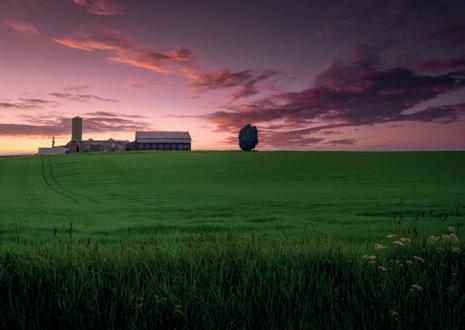


The agricultural census helps the Scottish Government better understand the farming sector in Scotland. Information farmers provide is vital to ensure an accurate picture of farming in Scotland.

Quality Meat Scotland (QMS) is hosting their second of their summer open days on 7 August at the Hodge family farm - Rulesmains, in the Borders.
The aim of the event, according to QMS Industry Development Co-ordinator, Lesley Mitchell, is to help farmers and crofters become more informed about the QMS ’Net Zero’ work and provide a network of people who can off er answers to questions surrounding this evolving and important industry subject. It will appeal to anyone wishing to learn more about practices aimed at improving profi tability and effi ciency while also reducing carbon emissions. Emma Hodge, alongside parents Jill and Andrew, runs the mixed arable and pedigree cattle farm at Rulesmains and the family team has 110 pedigree Aberdeen-Angus,
30 commercial Angus, and a handful of pedigree Hereford cattle. Pedigree cattle are successfully shown, and bull sale prices regularly reach fi ve fi gures. Commercial cattle are aimed to be fi nished at around 13 to 14 months of age.
The Hodges’ select cattle genetics which will ultimately create a profi table animal: one that fl eshes easily, provides excellent carcase quality, and has sound breed character. Livestock health is also paramount, and the family has invested in a robust vaccination programme. In 2023, the Hodges were winners the title of Scotch Beef Farm of the Year at the Scottish Agriculture Awards for their unrivalled enthusiasm.
For more information about the open day and to book your place, please visit: http://bit.ly/3VYHnhN
Well-known journalist, author, farmer, politician, fund-raiser receiptent of NFU Scotland and NFU Mutual award prestigious Ambassador Award in 2023, was delighted to received his MBE from His Majesty The King during a private investiture at the Palace of Holyrood. Andrew is pictured here with daughters Lydia and Elizabeth.

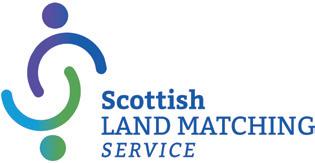
Scottish Land Matching Service received its 1000th enquiry in late June. This is a big milestone marking one thousand people seeking advice and guidance about, or off ering and looking for, opportunities in farming and crofting in Scotland. For more information on how you could benefi t from the Service visit https://slms.scot

Congratulations to George Lawrie, a past NFU Scotland Treasurer, who has been awarded the British Empire Medal (BEM) for his community volunteering in the recent King’s Birthday Honours.
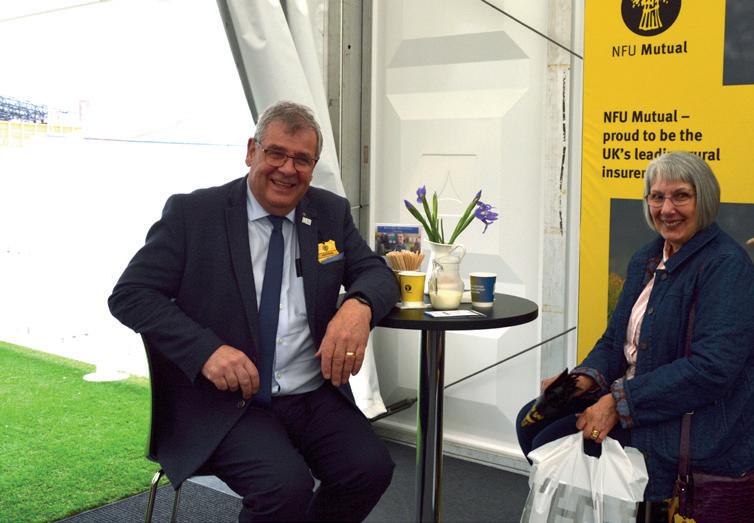
The Radio Teleswitch Service (RTS) is used by around 250,000 households and businesses in Scotland to heat their properties. Ofgem has advised that the technology to support RTS energy meters will be fully decommissioned on 30 June 2025. From 31 July 2025, RTS meters may no longer function properly, causing disruption to heating and hot water supply. Energy suppliers should start to proactively contact consumers using RTS to arrange a replacement smart meter. For those unable to install a smart meter, your supplier should off er you an alternative solution to avoid any service disruption or detriment.
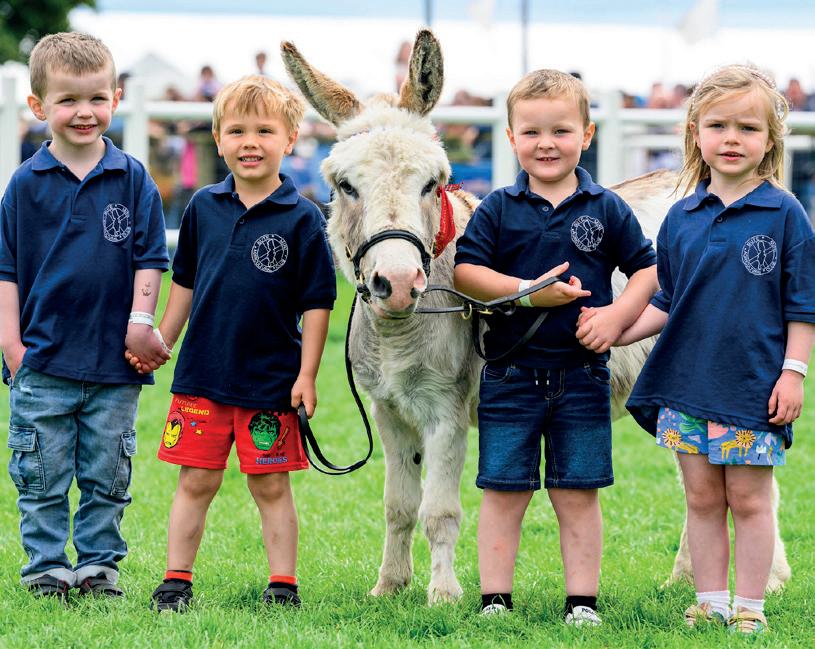
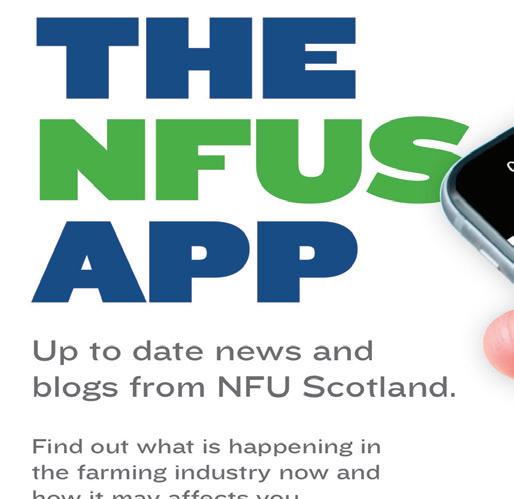
Four year-old pupils from Apple Tree Nursery in Argyll & Bute, Brogan Laurie, Neil George-McKirdy, Zander Simpson and Ava Wilson, travelled by boat and bus to present Miniature Mediterranean Donkey, Doris, with her First place rosette on Day 3 of this year’s Royal Highland Show.
After receiving a £400 donation from the RHASS Argyll & Bute Agricultural Committee, the pupils formed their own agricultural committee and decided to use the money to attend the Royal Highland Show.
We think that’s money well spent – well done!
We cover more from this year’s Highland Show on pages 18-22.
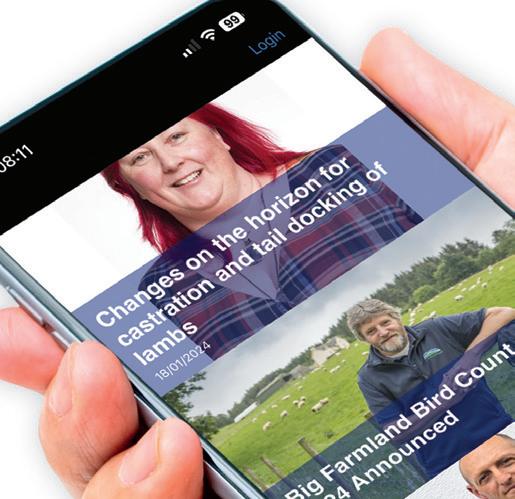


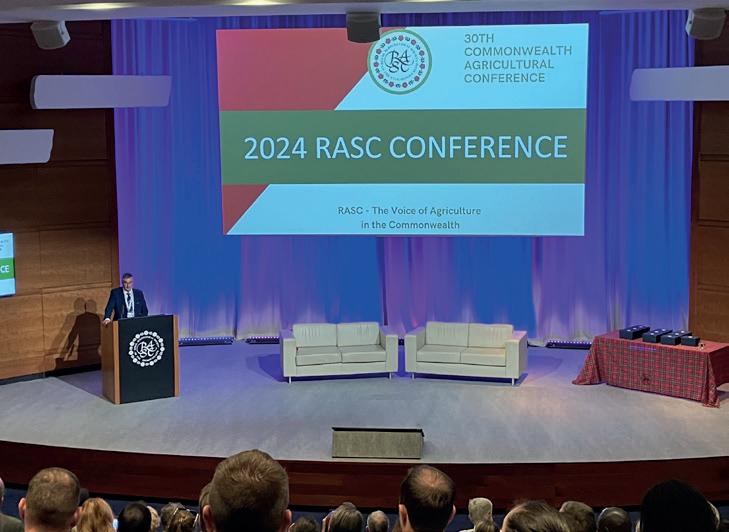
The Royal Agricultural Society of the Commonwealth (RASC) was founded in 1957 and is a confederation of more than 50 Agricultural Societies, from 21 Commonwealth Countries.
It is the only non-governmental organisation representing Agriculture across the Commonwealth and works closely with the Commonwealth Secretariat and other similar organisations, to promote and share knowledge to help develop and enhance rural communities.
It has a strong network of members, organisations and supporters who demonstrate best practices in agriculture, as well as bringing new ideas and research to the fore.
Membership of the RASC is open to leading/principal Agricultural Show Societies and Associations of Farmers within the Commonwealth but also welcomes other well-established nonCommonwealth based Agricultural Colleges, Research Establishments, and Agricultural organisations as Associate members.
Beinnially, the RASC hosts a conference, tours and seminars bringing the Commonwealth together to network, socialise, share knowledge and thinkings, and look to the future.
“It’s a gathering of like-minded people who are passionate about agriculture from all over the world, bringing with them all their energy and learning.” said Tom Martin, Founder of Farmer Time and previous delegate.
In June, it was Scotland’s turn to host the 30th Commonwealth Agricultural Conference, and welcomed 150 delegates, including 60 Next Generation representatives, from United Kingdom, Australia, New Zealand, Papua New Guinea, Trinidad & Tobago, Canada, United States of America, Zambia, Kenya, Zimbabwe, South Africa, Germany, Ireland, and Mexico to what was a highly informative conference. Many delegates also participated in pre-conference farm visits and accompanied by farm tours, days at the Royal Highland Show, and gala dinners. Enjoying the best of Scottish summer, the delegation had the opportunity to see, investigate and sample some of the best of Scottish agriculture, innovation and fayre we have to offer.
Sadly, the RASC Patron, HRH The Princess Royal was unable to attend following admission to hospital, but sent an apologetic message to the organisers
and participants wishing them all a productive and important few days of knowledge exchange.
I was delighted to be able to sit in on several of the conference sessions which were extremely intersting and inspiring. Anna Jones, Nuffield Scholar and BBC Producer discussed how farmers need to make their story ‘relevant’ to consumers, businesses and governments. She challenged thinking behind slogans and campaigns believing that they don’t always make the magical connection with the intended audience. To be ‘relevant’, and we have the potential to do so, everyone needs to find the sweet spot that will make their story become of real interest to others – not necessarily what we think is interesting.
Dr Himoogna Bernard Moonga, President of ACSZ (Zambia) made everyone envious of the amount of media coverage Agriculture got in Zambia. The leading national newspaper, carries a heafty agricultural supplement in it each week demonstrating the importance the sector in the country.
Reneé Alexander, CEO of Minniesota State Fair, staggered many with the thought of running a 12 day Agricultural Show. Held over a 322 acre site between Minneapolis and St Paul, the annual Fair contributes in excess of $300 million to the economy and despite landing in prime harvest season draws staggering numbers of visitors each day from the state and further afield. Over the decades the Fair has had to adapt to numerous different demands, but most significantly has adapted to the change of population. The population has boomed but also moved to be more urban than rural resulting in the Fair needing to cater to a changed knowledge base and understanding of agriculture from when it was first established.
Jude Capper, who has previously spoken at an NFU Scotland Autumn Conference, explored sustainability and how ‘all food has a carbon footprint of some sort’. In another engaging
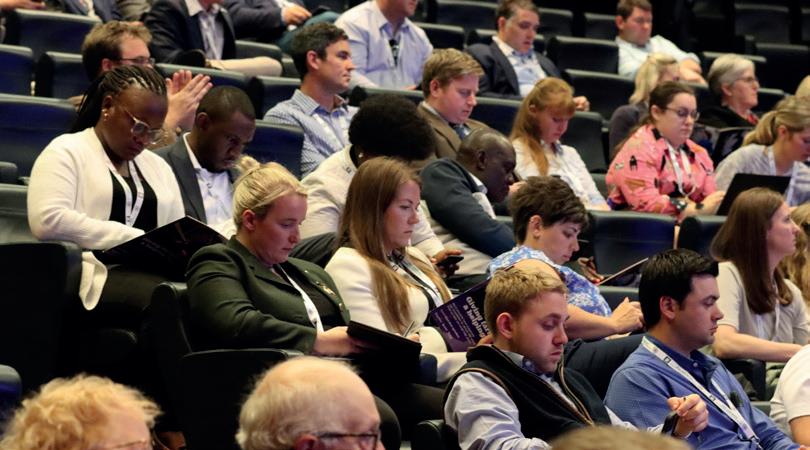
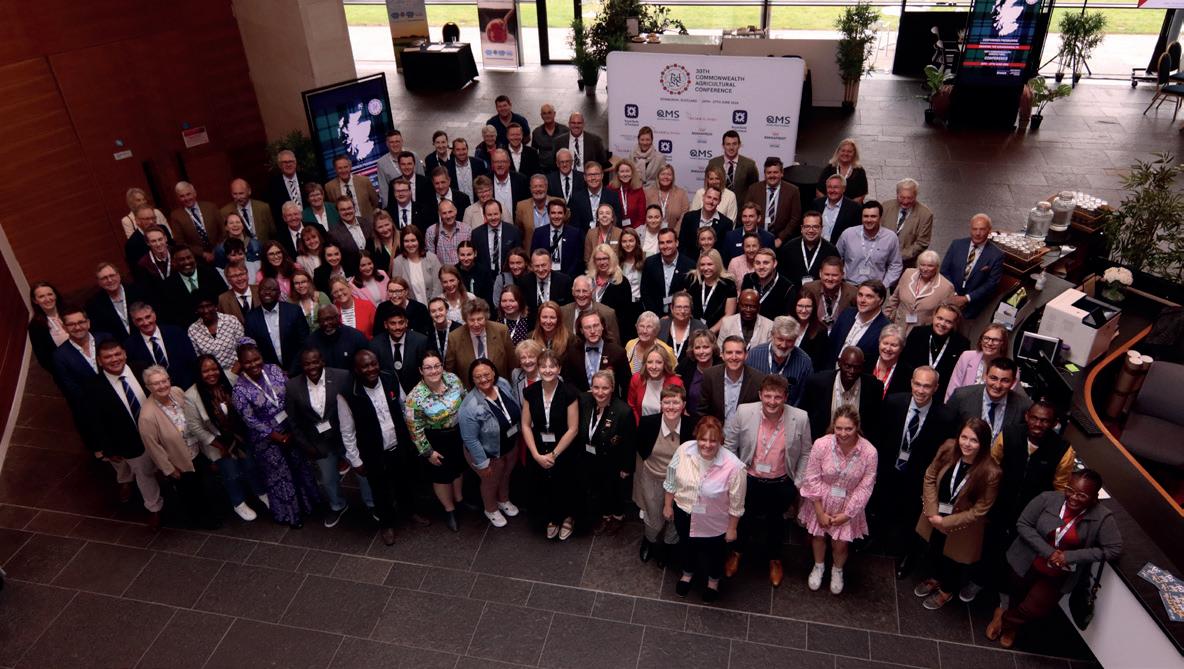
presentation she challenged the audience to think about the effectiveness of food labelling, impact of data and how it’s interpreted, the carbon footprint of farming, and how to change eating habits starting with school-age children. She concluded by saying that “all diets/food choices are equally valid and that the majority of consumers still enjoy meat within their diet”.
Organic farmer Patrick Holden, founder and CEO of the Sustainable Food Trust, highlighted within his presentation that “beef is one of the most carbon friendly foods you can eat” and that “dairy and beef are part of the solution” to tackling climate change.
These are few highlights from what was a packed conference programme that kept everyone asking questions and stimulating thought-provoking discussions during breakout sessions.
Following the event, RASC shared the following assesment of the event with Scottish Farming Leader,
“Scotland has proven to be an exceptional host for the 2024 RASC Conference, offering a unique blend of historic charm and cutting-edge agricultural innovation. The vibrant city of Edinburgh, with its rich heritage and dynamic community, provided an inspiring backdrop for our delegates.
“The conference sessions, centred around the themes of relevance, adaptability, sustainability, and connectivity, highlighted Scotland’s pivotal role in advancing agricultural practices.
• Relevance: Scotland’s agricultural societies exemplify the importance of staying relevant by continuously supporting their members and contributing to national and Commonwealth-wide agricultural development.
• Adaptability: The resilience and innovation displayed by Scottish farmers and researchers showcased how adapting to new legislation, policy changes, and industry demands can drive progress and success.
• Sustainability: Scotland’s commitment to sustainable farming practices, focusing on environmental stewardship and financial viability, provided valuable insights for delegates seeking to implement similar strategies in their own regions.
• Connectivity: The strong sense of community and the emphasis on connecting rural economies and societies underscored the importance of collaboration and shared goals within the agricultural sector.
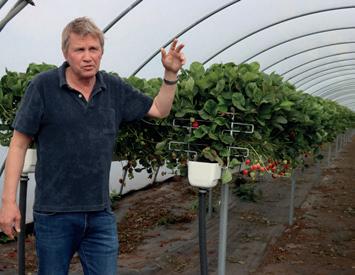

“As delegates return to their home countries, the take-home message from Scotland is clear: relevance, adaptability, sustainability, and connectivity are essential pillars for the future of agriculture. By embracing these principles, we can ensure a prosperous and resilient agricultural landscape for generations to come.”
The next conference will take place in South Africa in November 2026.
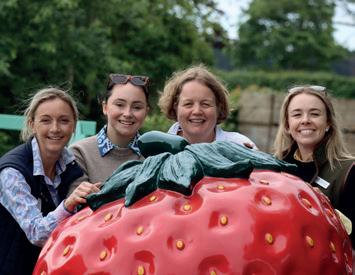



Beatrice Morrice Political A airs Manager



Walker Political A airs Assistant
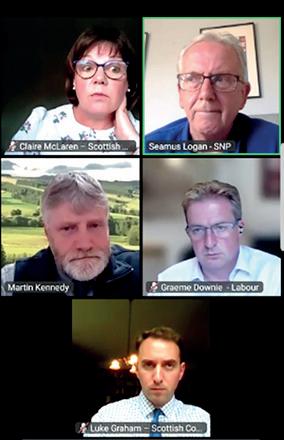
Prior to the election we held a national husting online with over 100 members joining in. Two candidates that took part on our panel are now MPs – Graeme Downie MP and Seamus Logan MP for Labour and the SNP respectively. We look forward to working with them and the other new and re-elected MPs going forward.

Since the election results, we have been busy engaging with the new UK Government and Scottish MPs. We wrote to all 57 Scottish MPs highlighting our key asks, that were mapped out in our manifesto, to deliver a profi table and sustainable future for Scotland’s farmers and crofters. Our regional team has also contacted newly elected and returning MPs encouraging visits to a local farm or local agricultural show over the summer parliamentary recess.
We have written to the new Prime Minister, Chancellor, Secretary of State for Scotland and Secretary of State and Minister for the Department for Environment, Food and Rural Aff airs. We will also liaise with members of relevant committees including the Scottish Aff airs and Environment, Food and Rural Aff airs Committees and identify opportunities to engage in their work over the course of the parliament.

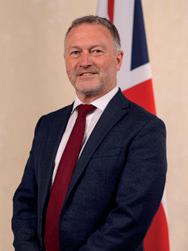
Over the coming months, we have several meetings arranged at the House of Commons and we will underline that successful farming and food sectors are at the very heart of the Scottish rural economy. Our immediate priority is securing a commitment from the new UK Government on an increased, ring-fenced and multiannual budget for farm support across the UK. Although this was not included in the Labour manifesto, we will continue to highlight its importance and the significant return of investment that this delivers.
We held many political meetings over the course of the Royal Highland Show this year. We met with 15 MSPs, the First Minister, Scottish Government Ministers and UK Government officials. Political meetings, including three Scottish party leaders included:
Lib Dems: Alex Cole Hamilton MSP, Scottish Liberal Democrat leader and Claire McLaren, Agriculture and Rural Communities Spokesperson.
Conservatives: Alexander Burnett MSP, Jamie Halco Johnson MSP, Finlay Carson MSP, Rachael Hamilton MSP, Murdo Fraser MSP
SNP: First Minister John Swinney MSP, Cabinet Secretary for Rural Affairs, Land Reform and Islands
Mairi Gougeon MSP, Minister for Agriculture and Connectivity
Jim Fairlie MSP, Jenni Minto MSP, Emma Roddick MSP, Emma Harper MSP
Labour: Anas Sarwar MSP, Leader of Scottish Labour, Daniel Johnson MSP, Rhoda Grant MSP
Scotland Office officials, Scottish Government officials
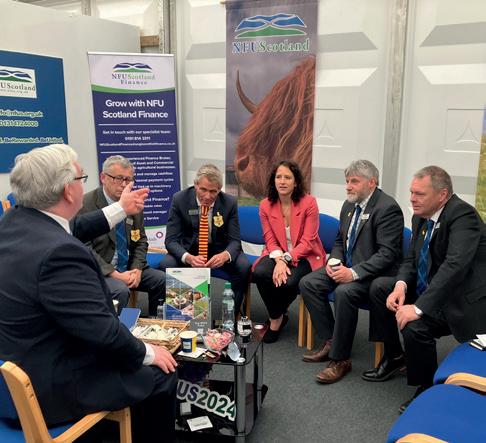

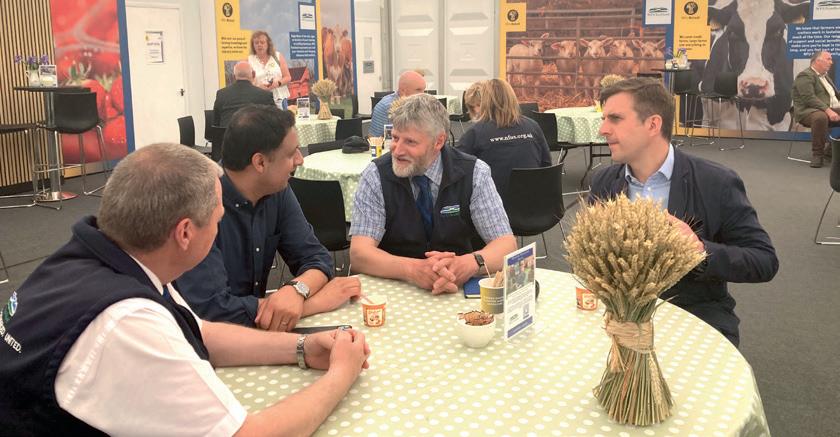
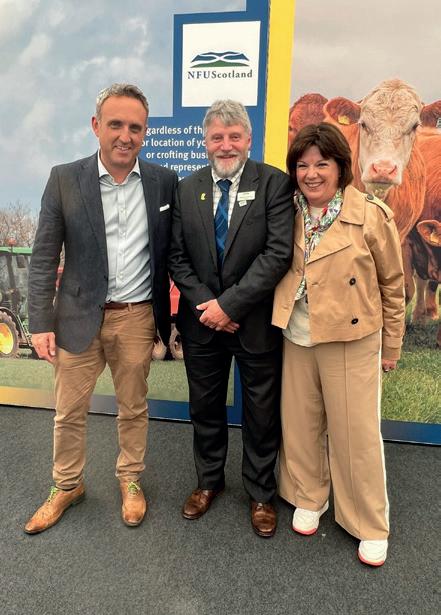

The 2024 Royal Highland Show was buzzing with activity from start to finish. We welcomed hundreds of members to the shared NFU Mutual/ NFU Scotland stand and thoroughly enjoyed your company. Thank you for stopping by to talk with us, catch up with friends, learn more about the Scottish Dairy Hub, Scottish Land Matching Service, NFU Mutual services, NFU Scotland membership and its benefits, and of course enjoy a cuppa, biscuit, sweet treat or strawberry tart! Thanks also for allowing us to take your photos – we’re sharing a few of those here. We’re also taking the opportunity to briefly flag a few of the activities from across the four days – but do check other sections of the magazine for more.
After six hours, more than 80 amendments and debate, the landmark Agriculture and Rural Communities (Scotland) Bill has passed at Stage 3, on the eve of the Highland Show. We used our press briefing on day one of the Show to map out what we believe the next steps are. See pages 33-34 where Jonnie Hall, explains what the Bill means and the timescales involved in detail.
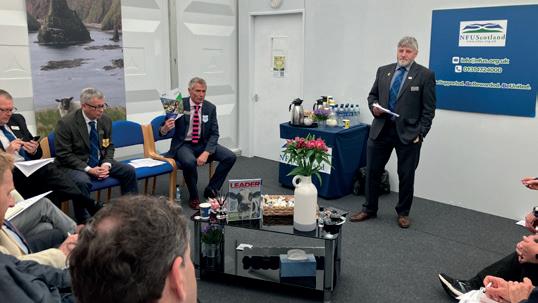

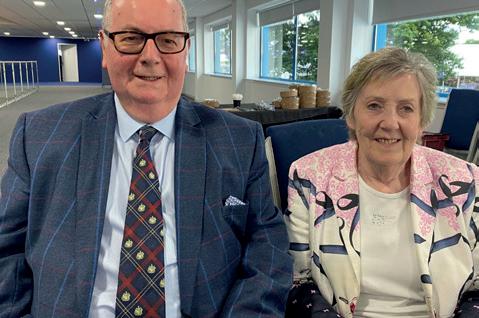

At his first Highland Show since becoming Scotland’s First Minister, we were pleased to welcome John Swinney to our stand on the first day of the show for a brief chat. Mr Swinney had an early start at the event, delivering the keynote speech at the QMS breakfast event. Although required in Parliament later that morning, it was great that he found time to catch up with President Martin Kennedy and Director of Policy Jonnie Hall. In his speech at QMS, the First Minister confirmed that Scottish Government’s payment timetable would be maintained, and that BPS and Greening payments would commence in September.


Farmers, the wider industry and journalists used the British Guild of Agricultural Journalists’ Highland Show reception to wish well-known couple Eddie and Marion Gillanders a very happy retirement. Eddie and Marion have been involved in the publication of agricultural magazines for decades, most recently Farm North East. Eddie’s journalistic career has also involved the Press and Journal and Agribusiness Scotland magazine as well as sterling service to the Aberdeen Angus society and breed as well as Aberdeen and Northern Marts. Eddie is a past recipient of North East region’s annual ‘Unsung Hero’ award, and it was fitting that Vice-President Andrew Connon spoke on behalf of the industry to wish them both a long and happy retirement. It is well deserved!









President Martin Kennedy presented Aldi with their ShelfWatch ‘champions’ certificate at the retailer’s stand. The results of our second ShelfWatch came out on the eve of the Highland and, for the second time, showed Aldi to be the biggest supporter of Scottish, 45 percent of its own brand goods were Scottish and it led in 12 out of 15 categories. Phase Two of ShelfWatch was conducted over a 48-hour period in late May. An independent research firm visited 73 stores across mainland Scotland, looking at own-brand beef, lamb, pork, chicken, eggs, vegetables, soft fruit and dairy products (milk, cheese, butter and yoghurt) on offer in Tesco, Asda, Morrisons, Sainsbury’s, Co-Op, Marks and Spencer, Lidl and Aldi stores. In total, more than 15,000 individual products were audited. You can read the full results of ShelfWatch 2 online in the news section of our website. In total, across all retailers, there has been a modest increase in the availability of Scottish own brand products since January.
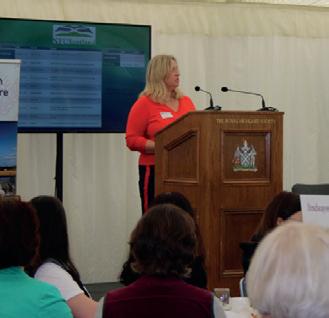
Caroline Millar used her presentation at the Women in Agriculture reception to encourage participation in the Union’s Diversity Discussion highlighting how and where interested parties could get involved and explain that NFU Scotland is seeking a wider cross-section of people from across Scotland to get involved with the Union and its work.
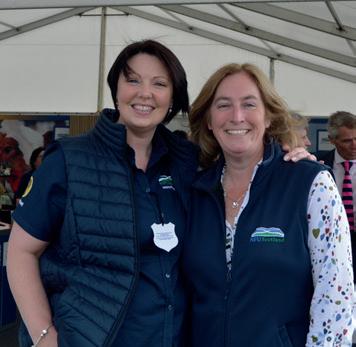






















Vice-President Alasdair Macnab spoke at the packed NatureScot reception on day two of the Royal Highland Show, Alasdair opened by welcoming the announcement from Scottish Government that a Wildlife and Species Management Forum is to be created – a long-standing ask from NFU Scotland. Alasdair references speaking at the event in his comment on page 7.
On science and practice, he used his presentation to call on Scottish



Government to explore the potential of light detection and ranging (LIDAR) technology in fl ood and river management, using it to identify where rapid runoff occurs in a catchment and where and how that can be managed and run off slowed. You can read more as a blog on our website or by scanning this QR code.
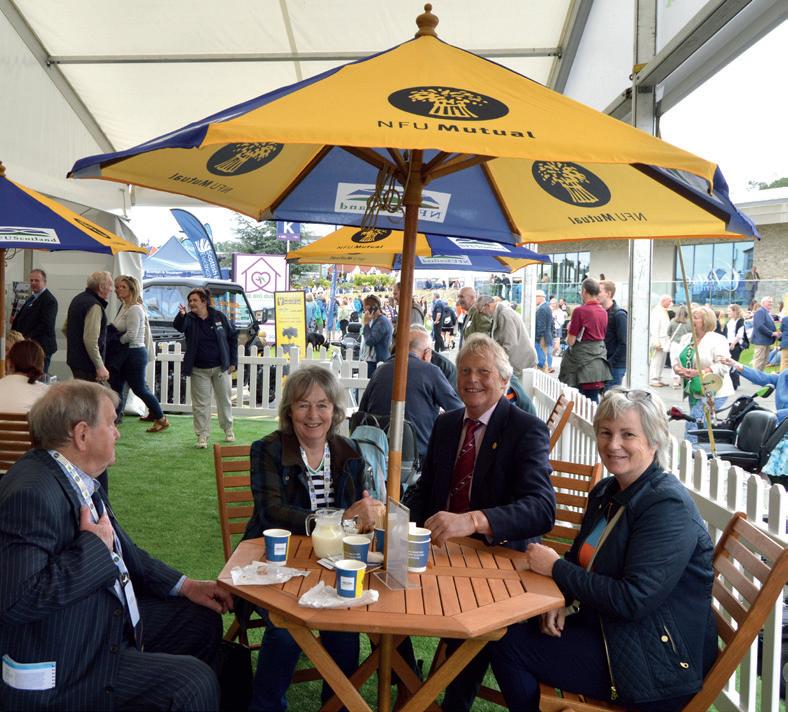

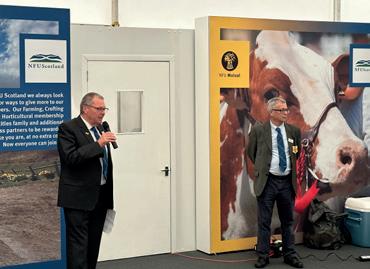
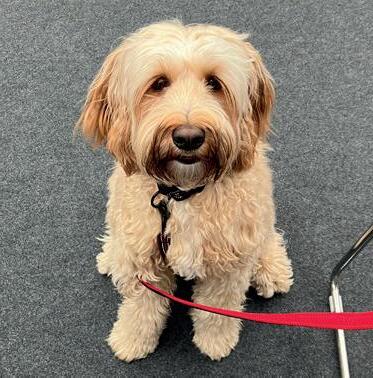
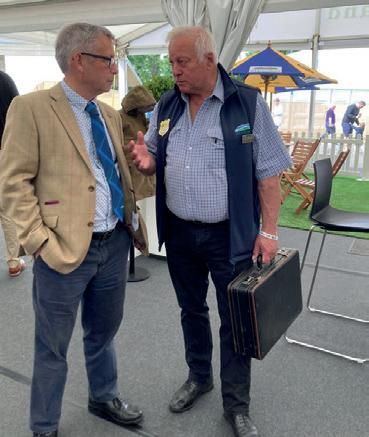
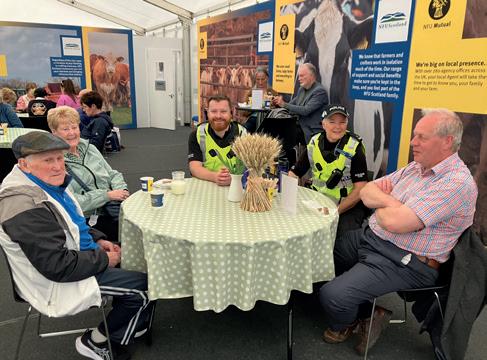

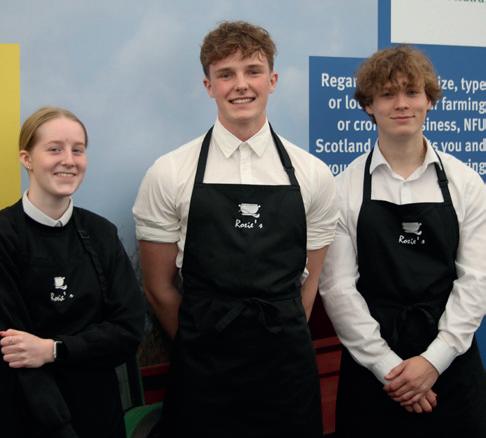

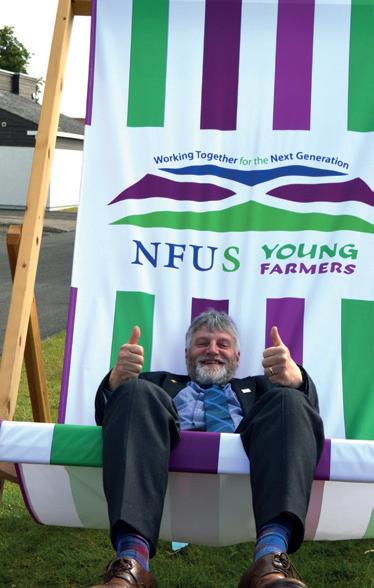
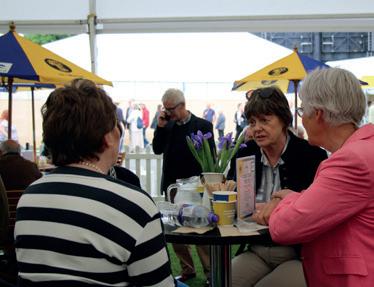
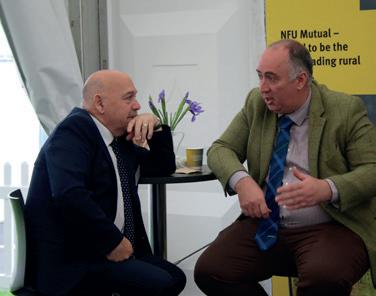
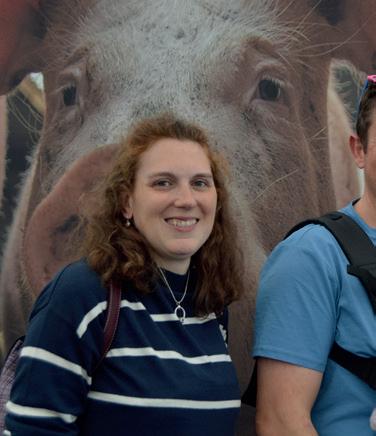




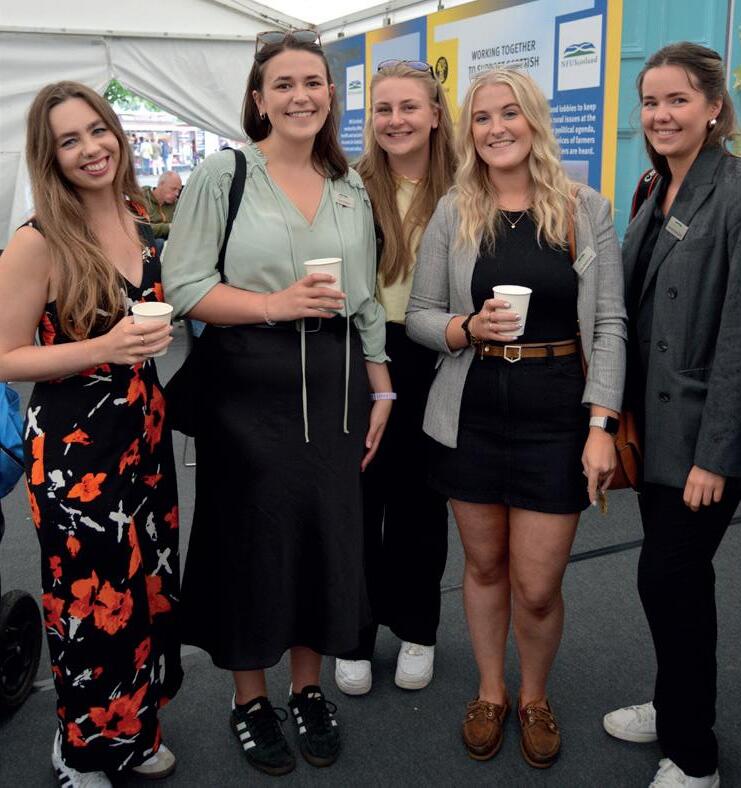

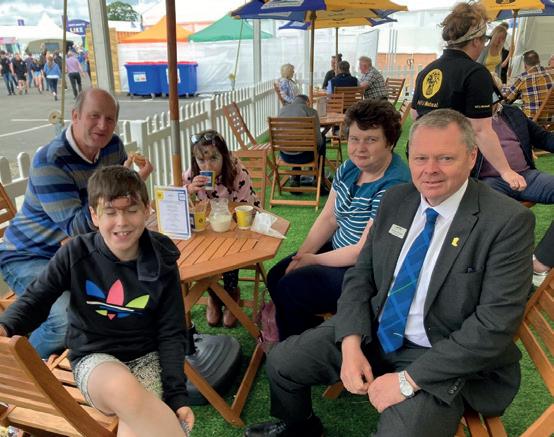
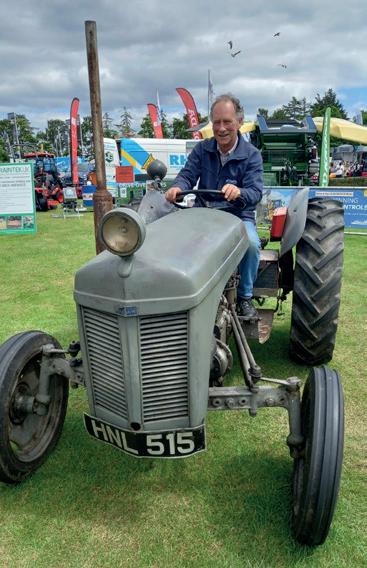
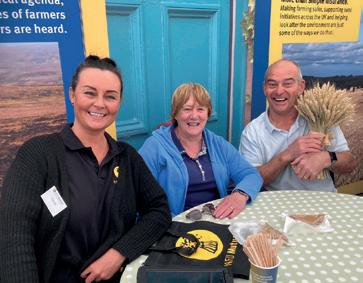
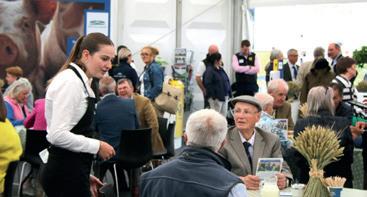





































































Sow the seed of sustainability and explore renewable energy options for your business with NFU Energy’s one-stop-shop service.
How it works:

• We identify the best renewable energy solution for you.
• We introduce you to one of our approved installers.
• We help you secure finance and insurance.
• We provide ongoing support.




If you’re interested in finding out which renewable energy system is best suited for your farm, then give us a call today!

Aspecial thank you to all our sponsors who generously donated some thirst-quenching beverages and delicious food for our evening reception.
Innis & Gunn for donating lager
Head-quartered in Edinburgh and with their own brewery in Perth, Innis & Gunn have grown to become one of the biggest independent brewers in the UK, exporting to over 20 countries around the globe. Innis & Gunn work with various Scottish suppliers to create their multiaward-winning beers, with malts sourced in Scotland, barley malted in Alloa and spent grains collected by local farmers for use as cattle feed.
Cheese for donating cheddar
A co-operative of dairy farmers created Orkney Cheese, which continues to produce Orkney Cheddar more than seventy years on. Making the cheese with local milk and by traditional methods means that Orkney Cheddar carries PGI status: it is protected and celebrated by EU law because of its heritage.
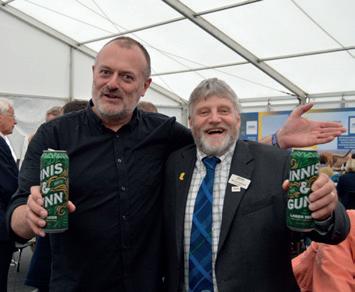
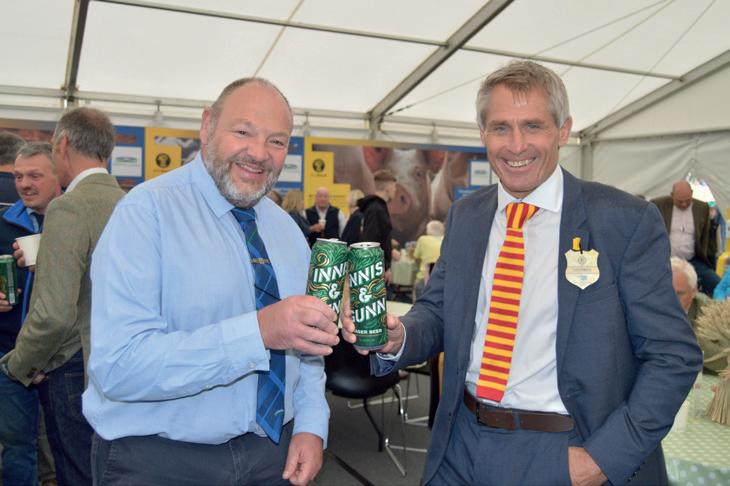
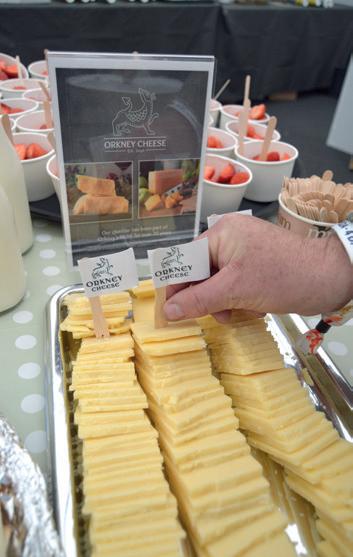
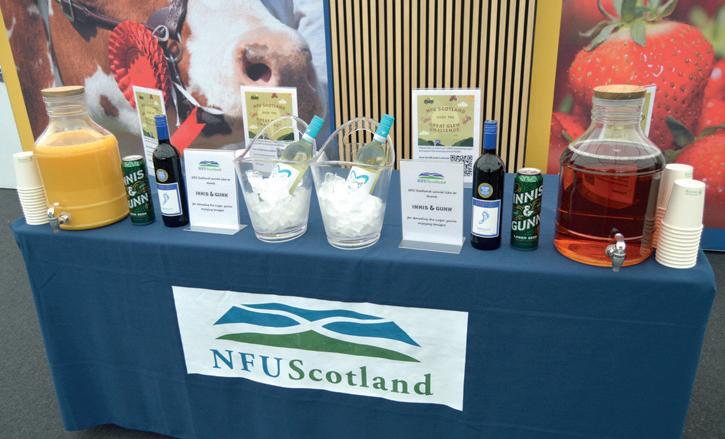
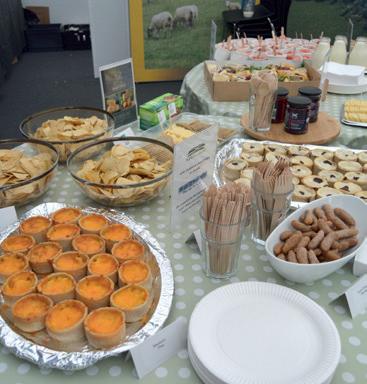
Boghall Butchers for discounting pies and sausages
Boghall Butchers is a multi-award winning, family run butchers in the heart of Boghall, West Lothian. Winner of the World’s Scotch Pie awards in 2005 and 2009
Strawberries and sausage rolls discounted and supplied by John Sinclair at Craigie’s Farm Shop, Café & Deli
Founder John Sinclair, his wife Kirsteen, their children Sophie and George and ‘Mrs S’, John’s mother Anne, are very much involved in the day-to-day running of the family enterprise alongside sixty or so staff members.
Craigie’s is an all-day café, deli, farm shop in Queensferry with contemporary dining area for homemade meals and baking from farm-grown goods. The establishment welcome 260,000 visitors each year.
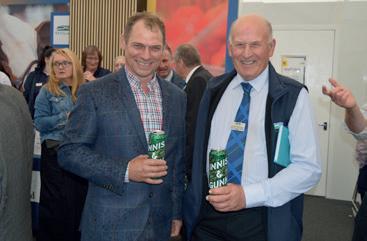

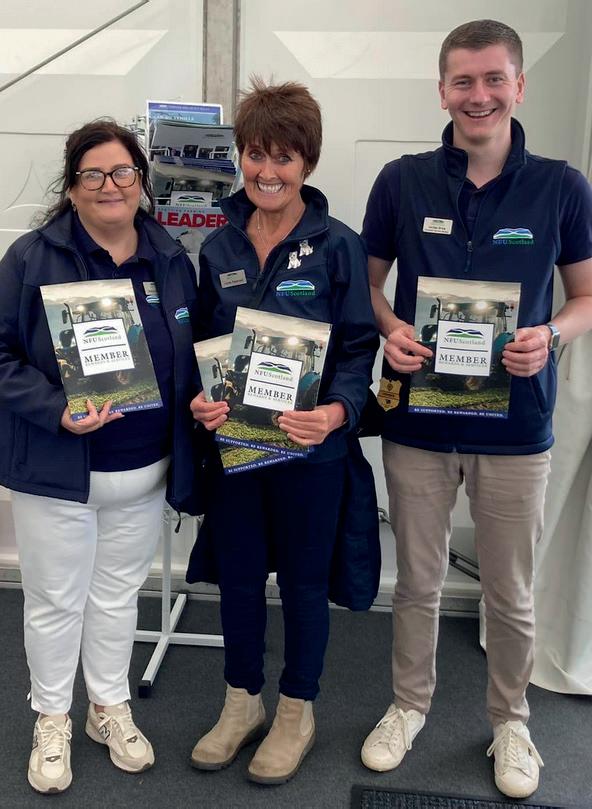
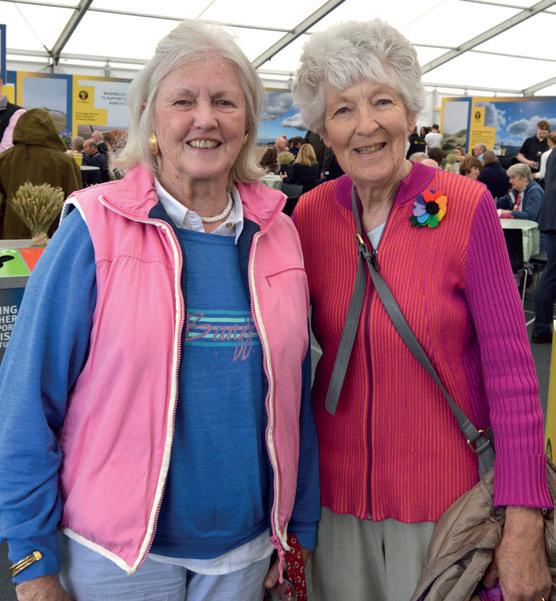
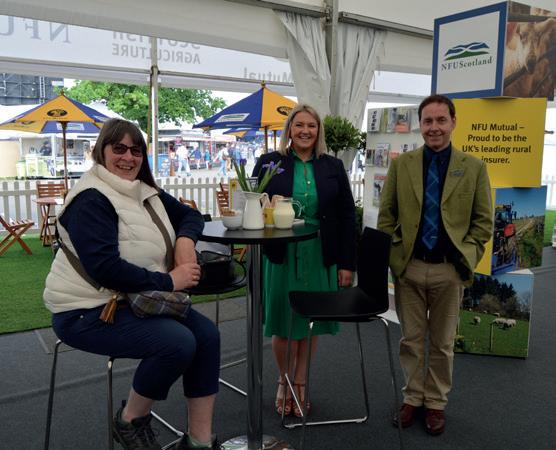
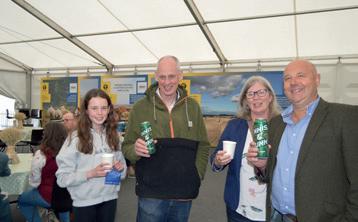
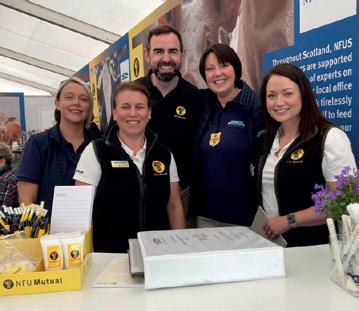
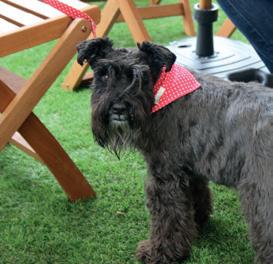
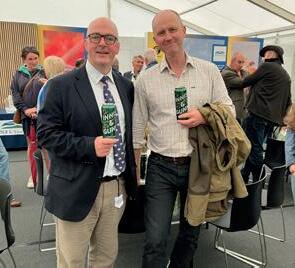
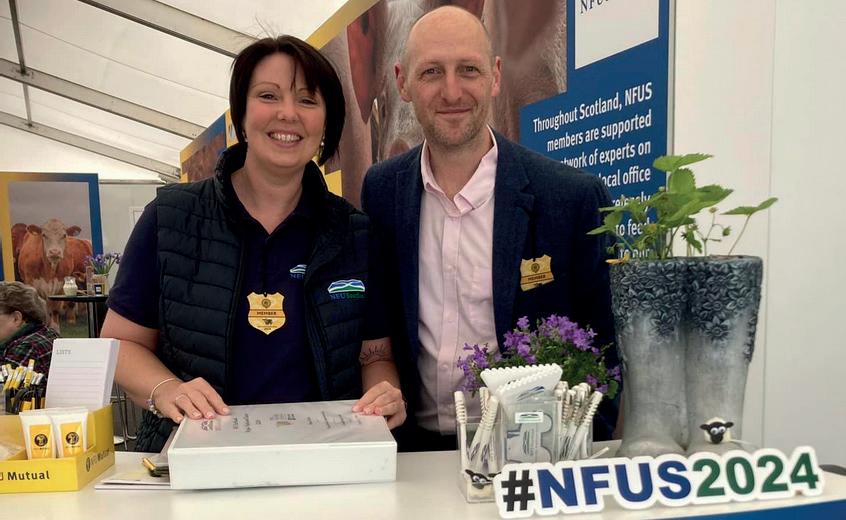
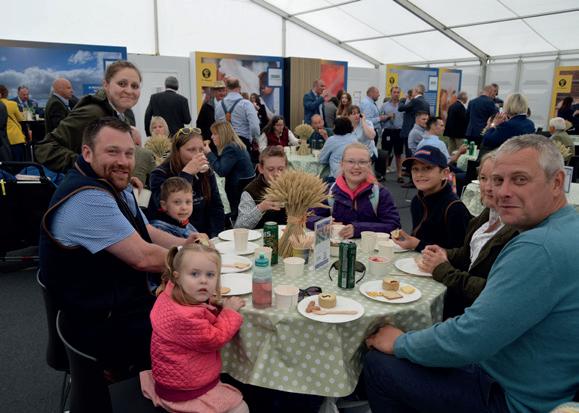
We’re saving NFUS members £39,000 per year on water bills
Unlike other business water retailers, our quotes don’t have hidden retail fees in the small print, and we don’t do exit charges. We have more 5-star customer reviews and more directly employed meter readers than any other UK water retailer.
We give all businesses the best deal on their water services, but we pay special attention to groups that have previously been left out of the benefits of the competitive water market in Scotland. That’s why we chose to partner with NFUS.
We’ve offered member rates to NFUS members for 10 years, and we estimate that we're currently saving NFUS members £39,000 on their annual business water bills.
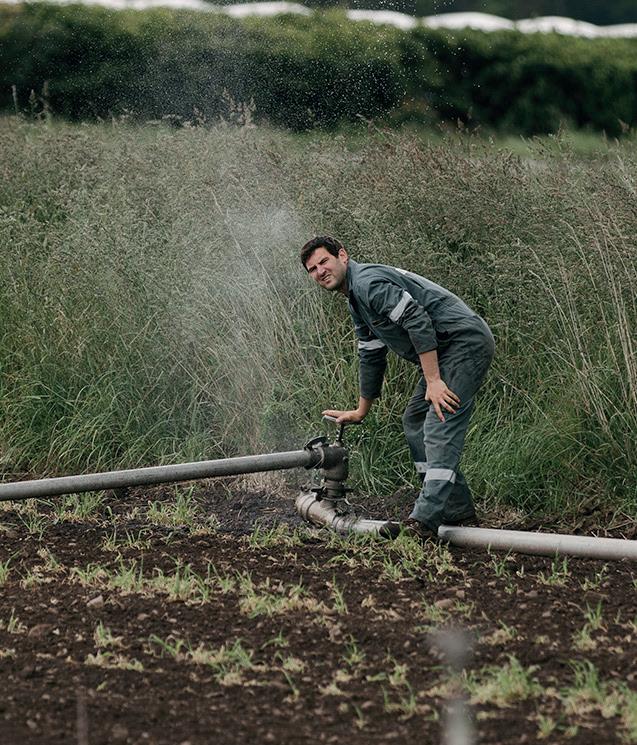



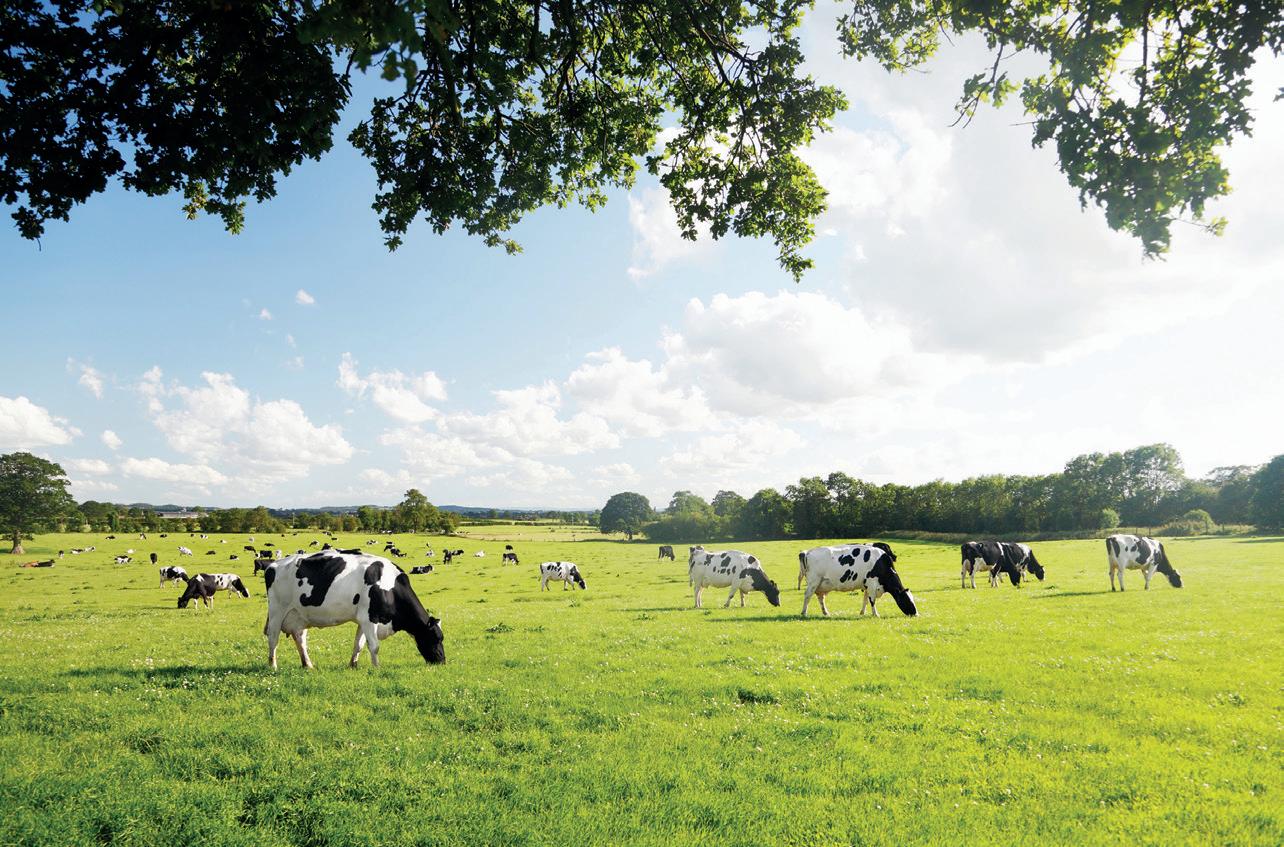


ITracey Roan Policy Manager
n June, Scottish Yew Tree producers received the news that Yew Tree Dairy had reached an agreement with Muller to acquire the site at Skelmersdale. The deal is subject to approval from the Competition and Markets Authority (CMA), and once approved, all Yew Tree producers in the UK will move over to Muller later this year.
Shortly after the announcement, our Milk Committee met with Richard Collins, Head of Agriculture at Muller, to seek reassurance for our Scottish Yew Tree producers. Due to the acquisition being subject to review by the CMA, Richard could not discuss details of the transfer of the Scottish Yew Tree suppliers to Muller; however, he did give reassurance that all current Yew Tree suppliers would move over to Muller when the sale is approved which is anticipated to be September/ October 2024.
Members of the Milk Committee took the opportunity to raise concerns about Scotland losing its ‘lifeline’ for dairy farmers who lose their milk contract and the ‘door now closed’ for new entrants wanting to start dairying in Scotland. Richard advised that with the acquisition, opportunities and growth will come, due to the benefi t of expanding into the global dairy commodities market. It was
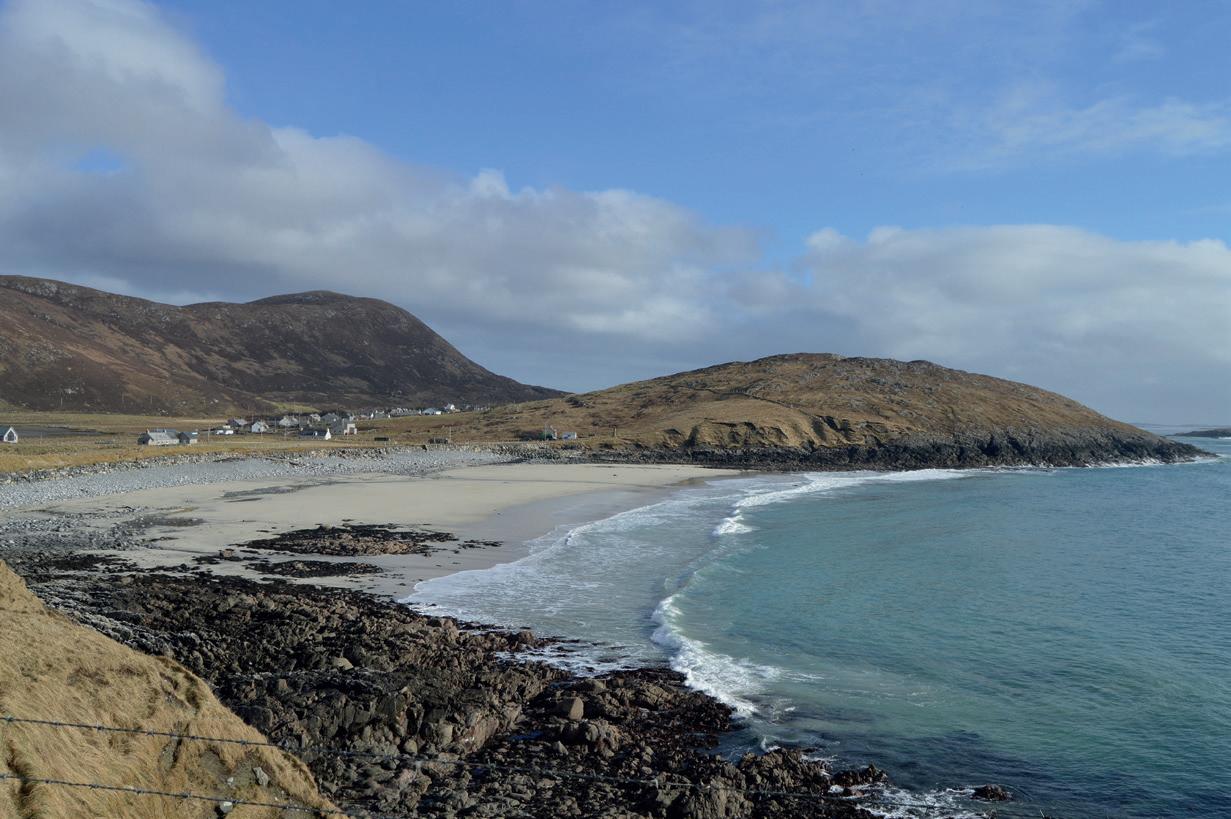

It was great to see so many top prizes being won by Scottish Dairy farmers in the new ‘Milk and Cream’ category in the Dairy Produce Championship at this year’s Royal Highland Show.
Taking the top spot with Overall Milk Champion was Jolly Jersey from Nether Lethame Farm, Strathaven. Creaming the top award with their double cream was the Neilson family from Park Farm Dairy, who also won another two awards, Reserve Overall Dairy Champion and Bronze for their semi-skimmed milk.
Winning Bronze awards for fresh whole milk were Lochhill Dairy Co, The Coo Shed, Arran Dairies, Wee Isle Dairy, Balnab Dairy, Law View Dairy, and Humeston Byre. Well done!!
mentioned that Muller had not recruited in Scotland for the last eight of nine years, allowing existing producers to expand. Richard advised that they hoped, in time,
recruitment would start again in Scotland. NFU Scotland will continue dialogue with both Yew Tree and Muller during this transition and keep members updated.



Rhianna Montgomery Policy Advisor
After years of work behind the scenes, the Scottish Government published proposals for Crofting Law Reform in June. We have spent the recent weeks digesting the consultation proposals, many of which have been discussed in detail at the Crofting Bill Group.
The consultation can be broken down into six sections;
• Entry to crofting
• Crofting communities
• Use of Common Grazing
• Strengthening residency & land use
• Enhance crofting commission powers
• Simplifying Crofting.
The Crofting Highlands and Islands Committee met in July to discuss initial reactions to the proposals and will continue discussing specific aspects of the consultation throughout the consultation process. We have been collating views from our crofting members via an online survey to gather vital information that will help to inform our final submission.
We welcome any information from our members and if you would like to share your views, please contact me at rhianna.montgomery@nfus.org.uk. The Government consultation closes on 2 September 2024.




Lucy McGillivray Policy Assistant
Avery enjoyable Royal Highland Show is over for another year. The Show provided an opportunity for our Next Generation group to increase their political engagement and once again highlight key issues. We teamed up with SAYFC to ensure the voices of the next generation were heard.
Thursday was kicked off with John Davidson and Penny Montgomery (SAYFC CEO) signing an official Partnership Agreement between NFUS and SAYFC. The purpose of the Partnership Agreement is to
outline commitments from both organisations that will enhance joint working on issues affecting Scottish agriculture in the joint interests of each organisations’ members. We already have a great working relationship with SAYFC, but formalising this into an agreement ensures we have a clear direction going forward.
It was our joint efforts that made the SAYFC Agri and Rural Aff airs Reception (held after partnership agreement signing) such a success. We are very grateful to Cabinet Secretary, Mairi Gougeon, for coming along and listening to our
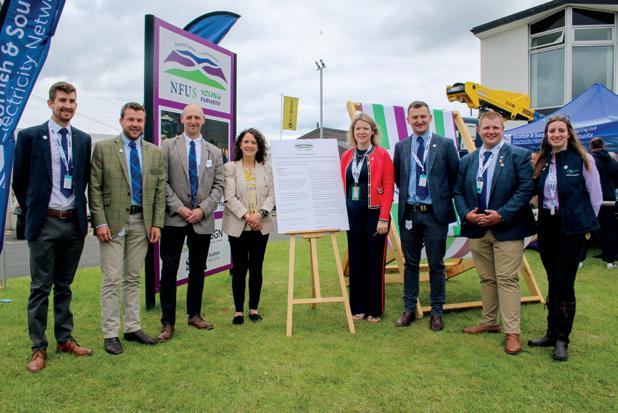
key issues. Ben McClymont and Ally Brunton did an excellent job of outlining the need for sufficient funding for practical training courses and apprenticeships, and underlined our concerns about the impact the Land Reform Bill proposals may have on the Next Generation. We also made the case for supporting young people into agriculture, including Next Generation Support in the Future Support Framework.
We look forward to continuing our engagement with Cabinet Secretary on the important issues outlined above.
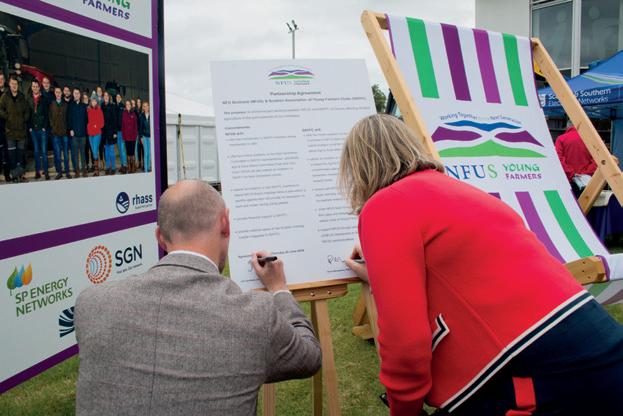
Scottish Government issued a consultation in April looking at banning the use of cages in egg production, including pullet rearing and breeding. It was an SNP manifesto pledge and featured in the past two Programmes for Government, alongside banning the use of farrow crates in pig production.
We responded to their consultation highlighting the progress the egg industry is already
were banned in 2012, with many producers investing heavily in brand new enriched colony caged units at that time. The new colony cages kept hens in small groups, with more space and opportunities to carry out natural behaviours such as perching, scratching and dust bathing.
In the 12 years since it has become obvious that the industry will need to move to ‘cage-free’ production to meet the demands




Penny Middleton Policy Manager
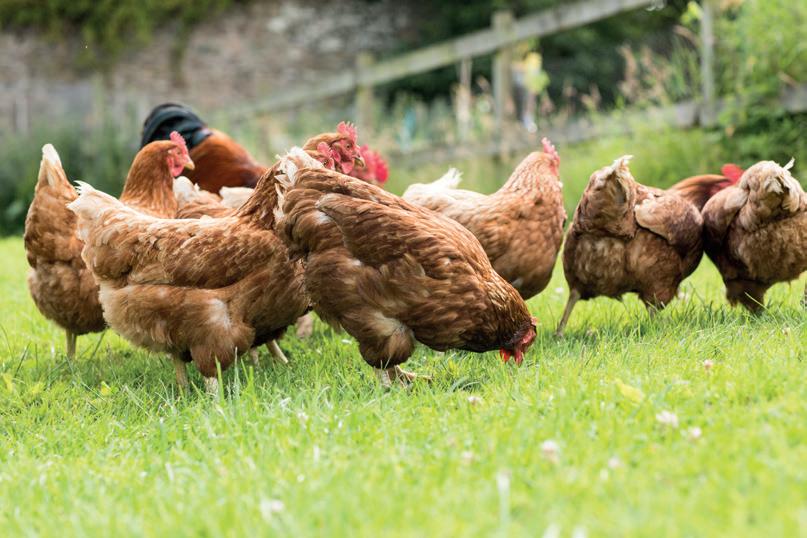




John Flanagan Senior Policy Manager
no need for the Government to introduce a ban where industry is making the changeover itself. Scotland already has the highest proportion of cage-free production of any country and that proportion is only growing.
New sheds, whether they are free-range, barn or colony caged are a significant investment and it is reasonable to expect producers to plan to spread that investment out over 20-30 years. Given that the current legislation has only been in place for 12 years it seems unreasonable to introduce further significant change, requiring more investment so soon, especially given that the industry is working so hard on its own to work towards change itself.
In our response to Scottish Government, we urge them not to introduce legislation and deadlines, but to help support the sector to progress on its own. We also highlight the importance of a level playing field and consistent rules across the UK, and the need for imports to meet the same standards.
Over the last 15 months, we have consulted members and led on discussions around DGP. We had six key tests where we required each of the conditions to be met before we could fully support the initiative. These tests are:
• Is it accessible?
• Is it efficient?
• Is it fi t for purpose?
• Are the costs proportionate to the benefi ts?
• Will the data be owned by those who provide it?
• Will the farming sector have a say in how data is used?
In the consultation on the previous version, we considered that these tests had not all been met. However, the business case
around DGP has been revisited with a view to address many of the concerns of both farmers and stakeholders. There has also been clear pressure coming from our supply chain customers (millers, maltsters etc.) seeking to implement digital supply chain traceability (this or their own), which adds additional urgency.
On 28 June, our Combinable Crops Committee met again to discuss the final business case put forward. The decision of the Committee, based on soundings from its members in the regions, is that we remain unsupportive of DGP. There’s a feeling that the current paper system is functioning well for what our farmer’s need. Broadly, the
committee’s view regarding the six tests remains unchanged. There question marks regarding accessibility, efficiency and proportionate costs remain.
This representative view from NFU Scotland was taken to the DGP Leadership Group and the AHDB Cereals & Oilseeds Council, and the ramifications of this remain to be played out.
Our committee wishes to move on from this area of discussion now and refocus its activity on the industry priorities linked with the profi tability and sustainability of the sector. The next meeting of the Combinable Crop Committee will be in Autumn.
In the meantime, good luck everyone with the Harvest!
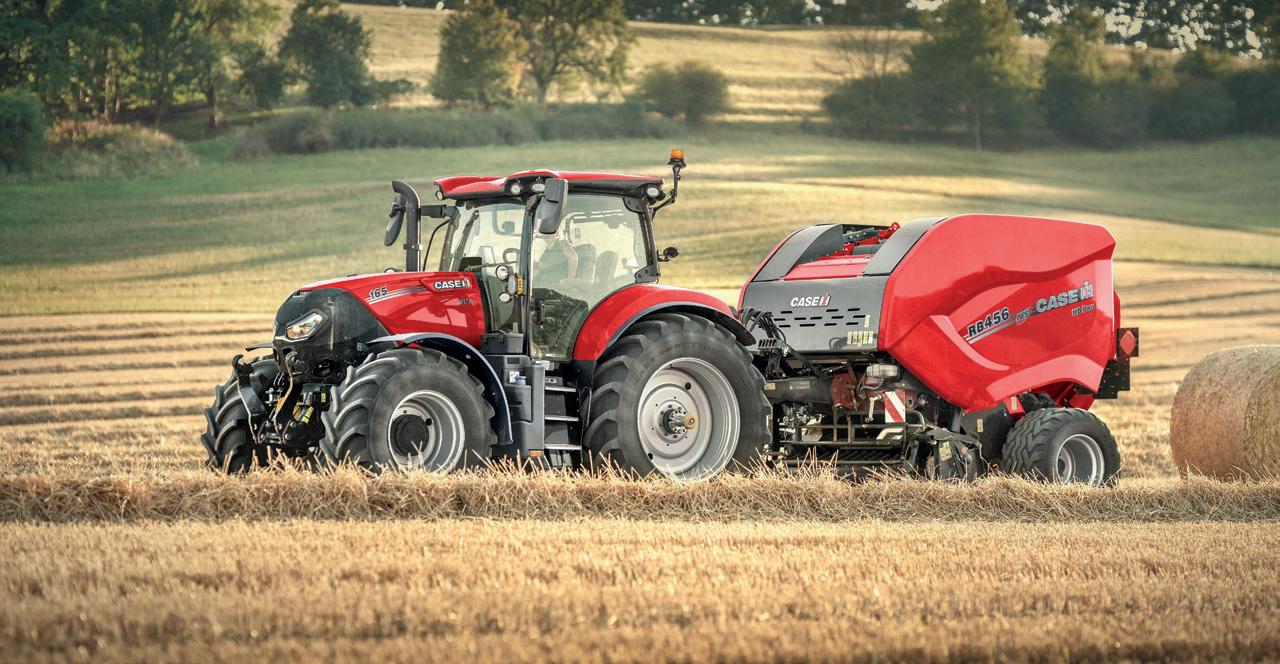
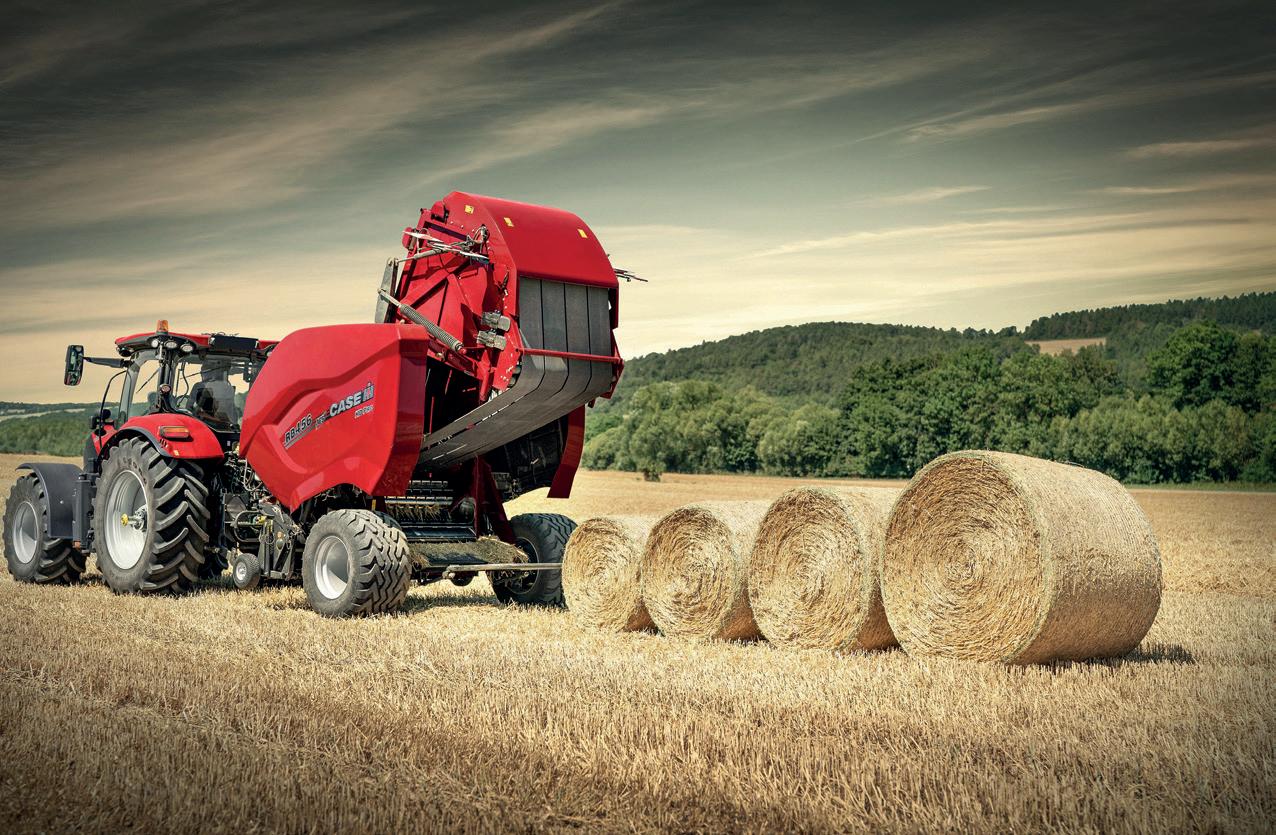
Scottish Machinery Rings are working in partnership with Case IH dealers to provide an exclusive rebate for members on their latest machines including the RB HD Pro Variable Chamber Series.
These balers are the perfect all-rounders. With a heavy duty design, these balers rely on a robust drive line and premium material for maximum lifetime and minimum downtime. The choice is yours with two models to produce bales up to 165 or 190cm, and RotorFeeder or RotorCutter options with 13 or 25 knives.











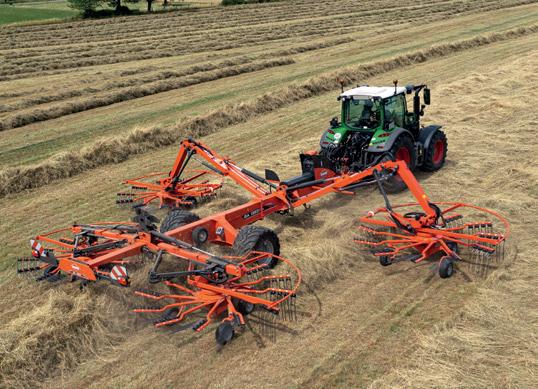



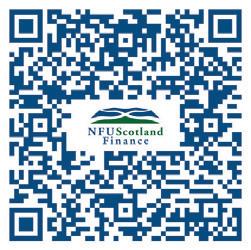







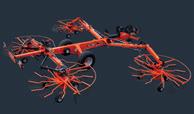





Ian
s reported last month, I spoke at the Scottish Land Commission Conference held in Aviemore in June. The theme of the conference was around “Shaping Scotland’s Future Through Inclusive Land Ownership” with the seminar session I spoke at looking at “Supporting small-scale –collaborative approaches for
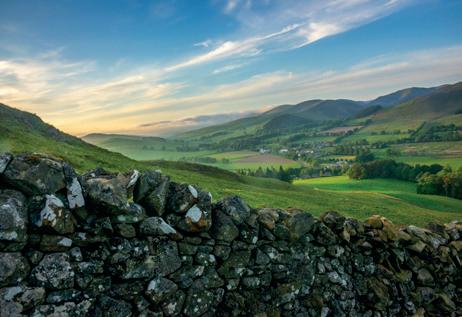
improving access to land for small-scale land management and use”. Really interesting to hear diff erent perspectives from the other speakers – Alison Anderson and Kate Trehane who are the Greenspace Team Leader and Community Allotment Offi cer respectively with Dundee City Council. They were supported by Councillor Heather Anderson. We also heard from Jamie McIntyre from Woodlands Croft Partnership and Huw Connick who is the owner of a small team delivering environmental, ecological and land-based services across Scotland.
The key message for me from the session was that there is huge demand for small-scale land management use and there are so many innovative people out there to help promote and deliver new and diff erent approaches.
Crofting is seen by many as almost the ultimate vehicle for
small scale land use and there were many calls throughout the seminar to see crofting extended across Scotland. Food for thought but I don’t think that would necessarily solve the issue of access. It will be interesting to see where the next iteration of crofting law takes us and if it helps provide opportunities for people within the existing crofting areas.
We have had our crofting specifi c registration forms running for just over a year now and those registering with us seeking crofts have far exceeded expectations –numbers now stand over 320. We are feeding the data back to the Crofting Commission as it provides real hard evidence of demand.
Finally, a belated thanks to everyone who either popped into the NFUS stand at the Royal Highland Show to say hello or who were happy to chat as I made my way around the show – much appreciated.
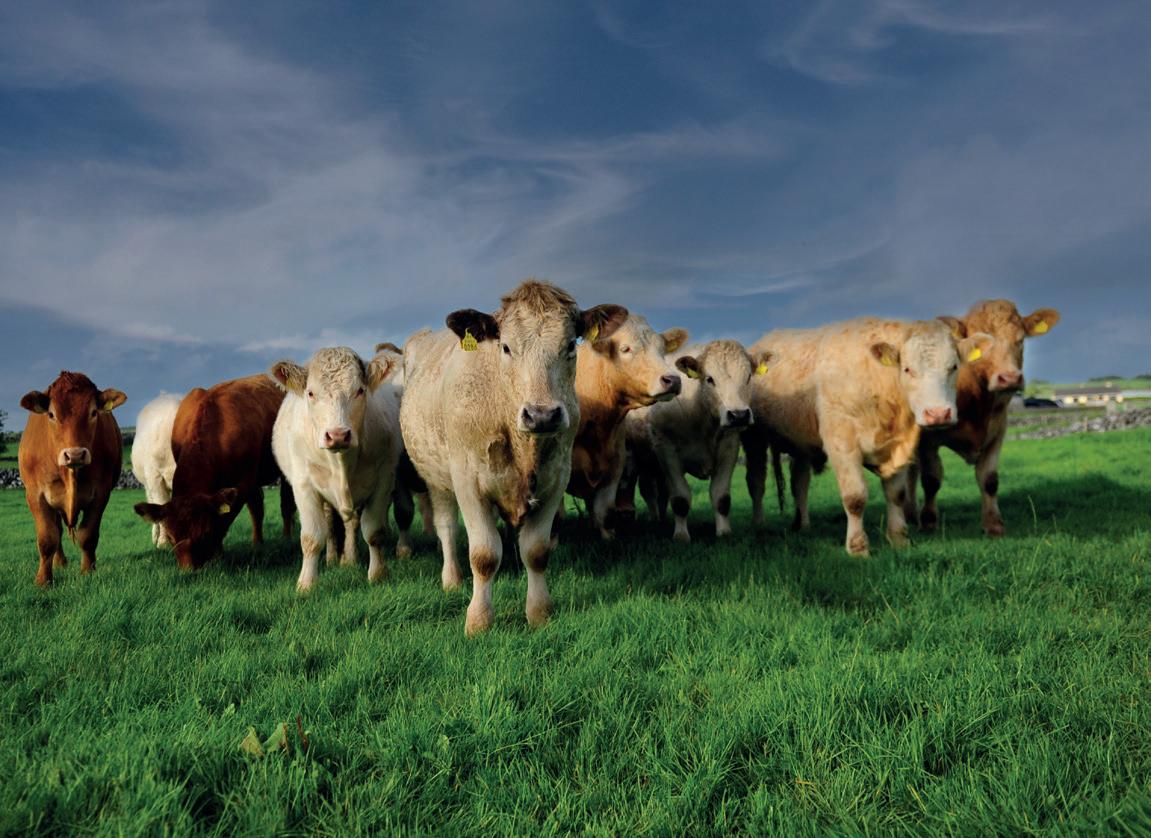
Scotch Lamb.
George Brown 07971 147775
Liam Bruce 07970 460947
Jean Mackay 07795 831200
Bill MacKinnon 07799 887146
Alasdair McSporran 07974 751489
Procurement Office 01294 475583


Sarah Cowie Policy Manager
As Policy Manager for Climate and Land Use issues, I always get asked about peatland restoration – what are the benefits, what are the risks and why is the Scottish Government pouring so much money into peatland? To help answer these questions and to provide a better grounding for our members on the key facts of peatland restoration, we held a member webinar in early July.
We heard from speakers from Peatland ACTION, the main body tasked with promoting and facilitating peatland restoration in Scotland. Stephen Varwell spoke about what peatland is and how it is formed, why so much of it is damaged in Scotland, and the




Lisa Hislop Policy Advisor
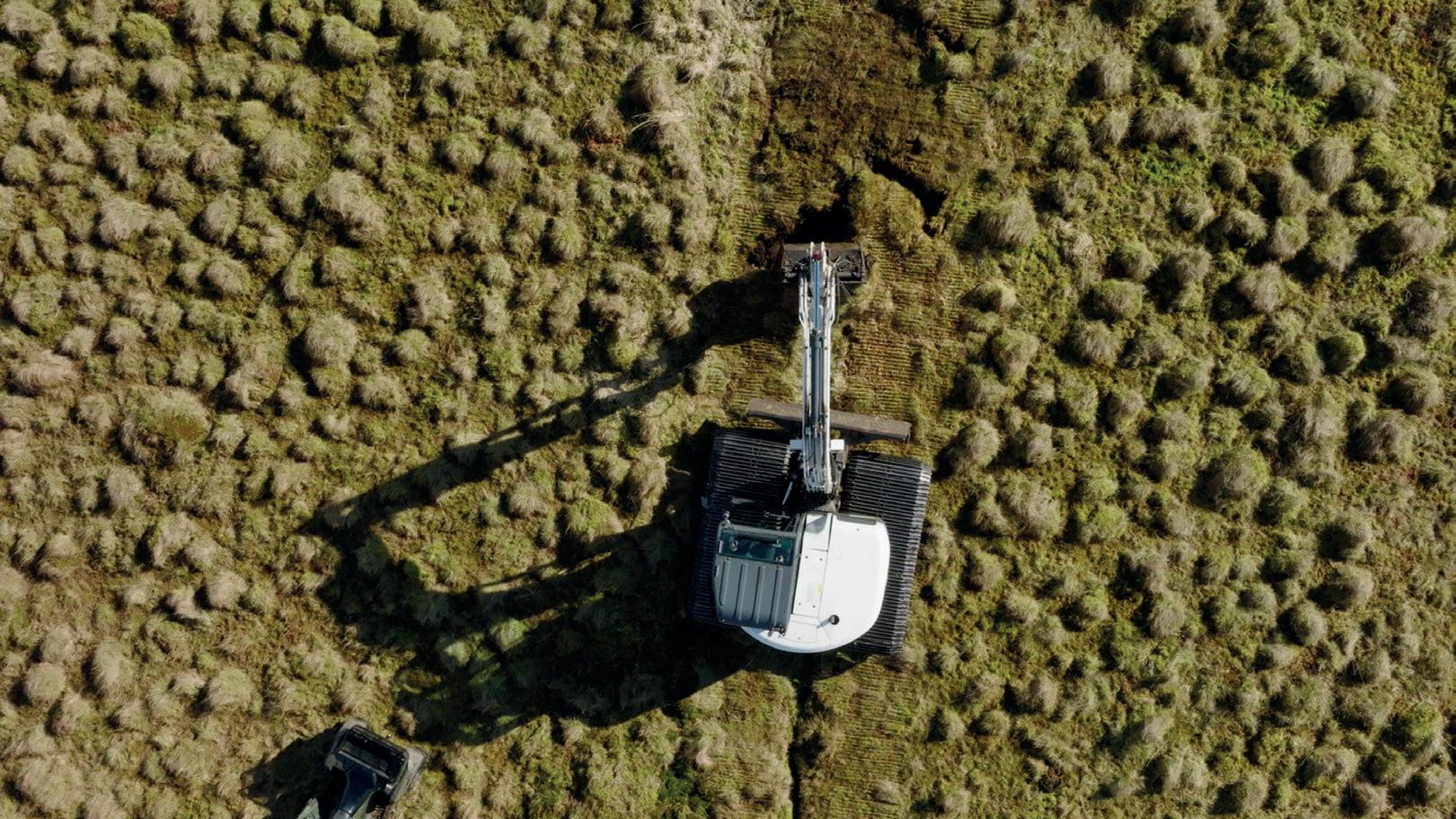
basic principles behind peatland restoration. He also highlighted why healthy peatlands can benefit farmers’ businesses, as well as help mitigate flood risk, improve water quality, slow the spread of wildfires, and help to tackle the climate and biodiversity crises.
We also heard from Gearoid Murphy, who explained how Peatland ACTION project officers can support farmers, landowners and agents throughout the
The efficiency of the livestock sector continues to be at the core of almost every conversation, it usually is framed in the environmental sense, followed by profitability. The direction of travel in a policy context is a journey to Net Zero. We continue to underline that as part of this journey we need recognition of the role of livestock in delivering public goods via active grazing. Furthermore, we remind policy makers that the options for climate mitigation are different for each farm or croft type, there cannot be any further decline in the herd without seeing consequences for
the critical mass of our red meat supply chains. What a finisher can do to reduce emissions and increase profitability has a nuanced difference from a suckler producers. With this in mind, we cannot forget what the end goal is, for the business to be viable and have a product the customer wants.
The SSBSS reform on paper is an example of incentivising an increase the calving efficiency and also boosting the output of the herd.
There are a lot of metrics which are debated and discussed to focus the mind on a goal to get the industry to ultimate goal of
peatland restoration process, from the initial enquiry, through the application process, designing the restoration project, managing contractors and completing the final paperwork.
Lastly, we heard from our very own member, Joyce Campbell, who some of you may be familiar with. Joyce is a hill farmer who lives and farms on Armadale Farm by the north coast of Scotland. Joyce spoke about her own experiences



of undertaking peatland restoration projects on her own farm.
If you missed our webinar, don’t worry. It is available to watch on the NFUS website. We are also certain this will be the first of many engagements with Peatland ACTION, and there will be more to come in terms of more specific workshops and webinars, as well as site visits. Please get in touch with me if you’d like to be kept up- todate or have any more questions.
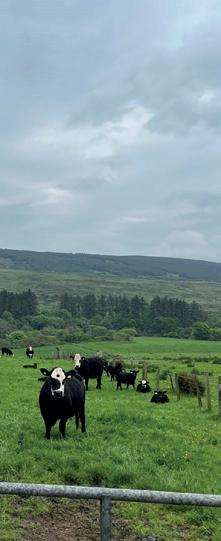
Net Zero. Whether it’s age at slaughter, which begs the question of how would this affect the final product? Or age at first calving, however how does this impact the longevity of the individual cow? As mentioned, these can be debated and discussed over and over, but it comes down to having a basket of options whereby each farmer or crofter can select the metrics which best fit their system. By having a flexible approach, there is an option for each system type to move forward on the journey with the end goal of every doing their bit to reduce emissions. This needs to be underpinned however by clear communication and appropriate advice as to what the direction of travel is and the practical measures to get there.


Gemma Cooper Head of Policy
In January, we began a year-long project to shine a light on how retailers are supporting our farmers and crofters. We commissioned an independent research company to visit 73 stores belonging to the ‘Big 8’ retailers in Scotland to assess availability of products and where this originated. We published these results at our AGM in February and following this we reached out to the retailers inviting them to meet with us.
For Phase 2, we have captured own brand and branded products, as well as price information. For our initial summary report, we have focused on own brand - this is where retailers sell products under their own brand and have more control over where it comes from.
Main headlines as below:
• There is a mixed picture of support across the retailers for Scottish and UK produce.
• Aldi had the largest amount of own brand Scottish and were top in 12 of 15 categories. Co-op were second and Lidl third.
• There is no significant increase in Scottish sourcing, the report shows a modest increase from January.
• There is strong support in eggs and fresh milk categories. There is some poor support in categories like pork.
• In terms of retailers’ commitment to British produce, M&S had the highest combined produce.
• Assessors picked up on some unclear labelling on bacon which needs to be understood further.
We met with several of the retailers at the Royal Highland Show to seek ongoing engagement to understand how we can work with them to support our Scottish producers more.
The Food and Farming team will consider further what the results tell us and how this links with policy and regulation. On issues such as labelling, there is certainly the opportunity to work at a UK Government level to improve clarity and recognition. Ultimately, we want retailers to support the amazing produce that members work hard to provide.
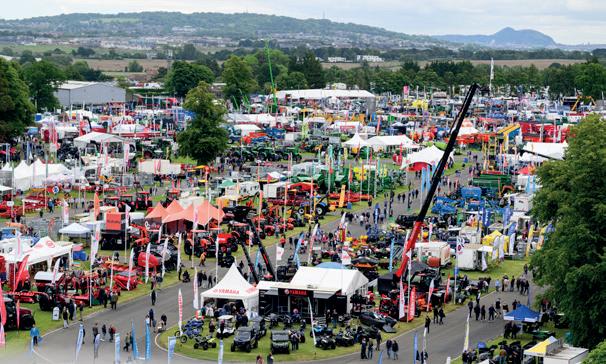
We are a farm waste management company, based near Dundee and have been trading for 14 years.
•
•
The types of waste we accept includes: Silage Wrap, Fertiliser Bags, Chemical Drums, Cardboard and Feed Buckets. Mixed loads of waste are accepted to make it as easy and affordable as possible for farmers to dispose of their waste.
Skips also available for scrap metal. Give
a call to discuss your requirements.

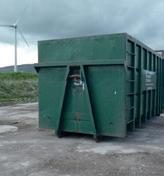
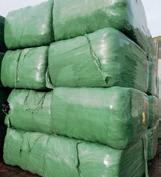









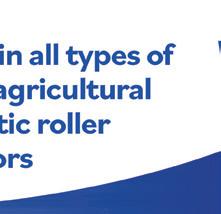

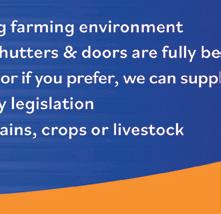






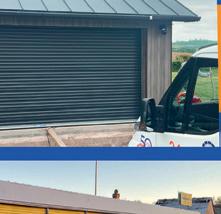

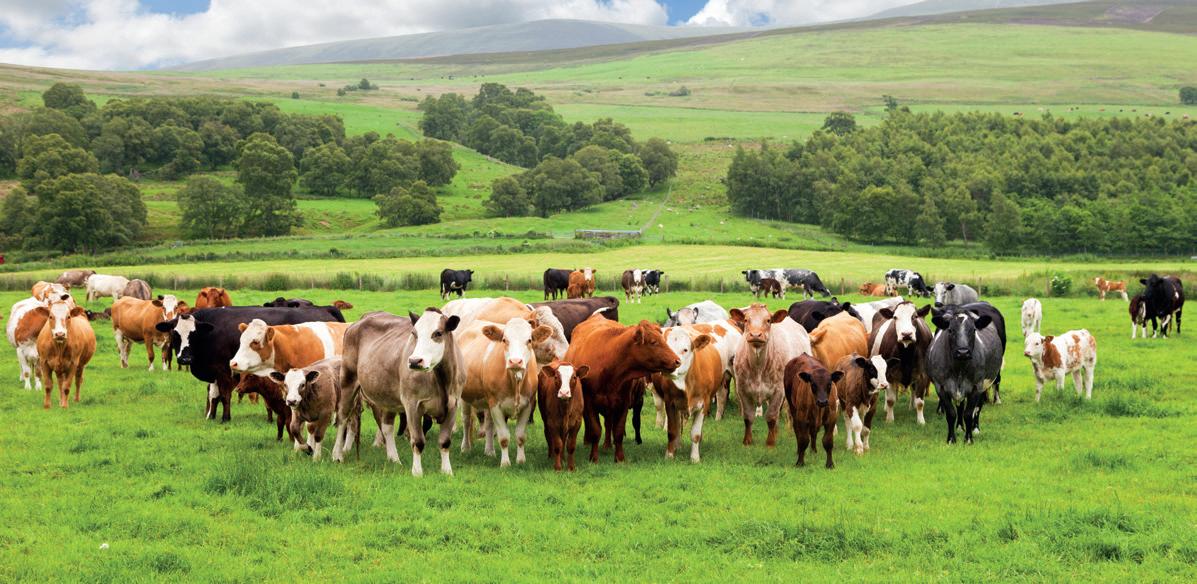





Jonnie Hall Director of Policy
he landmark Agriculture and Rural Communities (Scotland) Act 2024 was passed by the Scottish Parliament on 18 June. The Act, which was laid before the Scottish Parliament in its original form in September of last year, was subject to intense scrutiny throughout.
For the record, it was backed unanimously by 115 MSPs - 57 from
The Act is the necessary framework to develop the support that farming, crofting and rural communities need in order to adapt to new opportunities and challenges, and to prosper in a changing world.
Put bluntly, the Act enables the Scottish Government to provide fi nancial support for measures and schemes and to set eligibility criteria
Powers are one thing – it is how those powers are used that matters most.
the SNP, 27 from the Conservatives, 19 from Labour, all seven Scottish Greens and all four Liberal Democrats as well as the sole Alba Party member. No MSPs opposed it in the fi nal vote. With the primary legislation in place, the next steps involve developing and implementing the new four-tiered support framework from 2026.
NFU Scotland’s infl uence runs right through the fi nal Act – that’s all down to intense engagement over the last three years and more.
and conditions for receiving the support. It also provides the powers that are needed to allow a smooth transition from current support measures by creating the necessary powers to replace existing, and familiar, CAP schemes. These will be replaced with a new four-tiered framework of ‘conditional’ support from 2027.
In addition, the Scottish Government’s Agricultural Reform Route Map sets out signifi cant milestones over coming years. With
every milestone, farms and crofts across Scotland will have to adapt and embrace change.
But it’s also unequivocal that farmers and crofters must be recognised and rewarded for actions they take, and incentivised to enable change to improve the resilience, effi ciency and profi tability of the agriculture sector. Only then will the outcomes we all want be delivered.
A profi table, sustainable agricultural industry is key to Scotland’s ambitions and having the powers now in place to deliver the right support is crucial. Powers are one thing – it is how those powers are used that matters most.
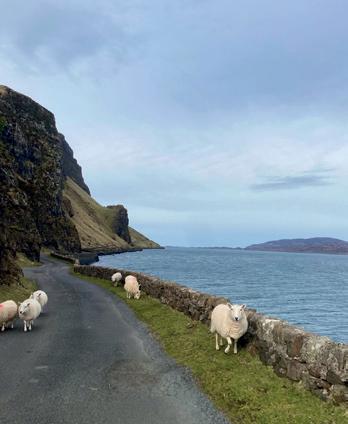
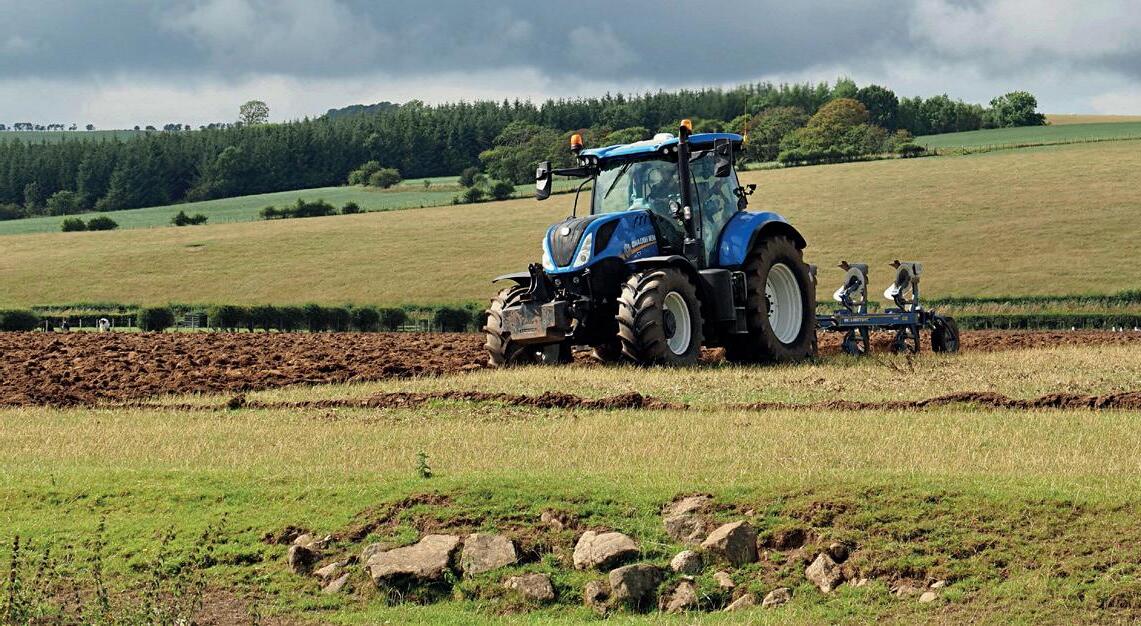
From 2025, the support framework will be aimed at delivering against the following fi ve outcomes:
• High Quality Food Production
• Thriving Agricultural Businesses
• Climate Change Mitigation and Adaptation
• Nature Restoration
• A Just Transition
While the new four-tiered framework for agricultural support will not be fully implemented until 2027 at the earliest, some requirements of the transition will come into eff ect from 2025 and further changes will take place from 2026 and 2027 as existing schemes evolve into the new four-tiered framework. (See key dates in blue box on right.)
Signifi cantly, the Act refl ects so much of what we have pressed for over the last few years. It now means we have the tools in place to implement a new agricultural support framework to enable farmers and crofters to deliver the desired outcomes around food production, biodiversity enhancement and climate change mitigation that only they can.
This legislation is vital as it enables Scotland, in a post-Brexit, post-CAP era, to develop its own approach to future policy and support.
We have been clear from the start –the Bill needed suffi cient fl exibility and scope to deliver for farmers and crofters across Scotland, and so much of what we sought is included is in the Act.
The real relevance of the new Act is that it is critical in enabling all elements of the transition to happen. That is exactly why we lobbied for and which we got in terms of the scope
As things stand, the timeline for change is expected to run as follows
• 2025 - Initial changes to existing support will be introduced with new conditions to the Basic Payment Scheme (BPS) through the Whole Farm Plan (WFP) and changes to cross-compliance
• 2025 - New conditions will be introduced to Voluntary Coupled Support (VCS) via the Scottish Suckler Beef Support Scheme (SSBSS) linked to calving interval performance
• 2026 - The Basic Payment Scheme will consolidate as Tier 1 (Base) payments, while Tier 2 (Enhanced) payments will be introduced based on the existing Greening delivery model
• 2027 - New Tier 3 (Elective) and Tier 4 (Complementary) support will be rolled out to incorporate agri-environment measures, forestry grants, and targeted capital grants, as well as farm advisory services and professional development
• 2028 - It is likely that transition to a replacement for the Less Favoured Areas Support Scheme (LFASS) will begin along with the incorporation of VCS, including the Scottish Upland Sheep Support Scheme (SUSSS), as direct support under Tiers 1 and 2
and fl exibility needed within primary Scottish legislation.
With the primary legislation in place, the task of developing and implementing the new support framework can really begin. It’s time to roll up our sleeves again.
To enable Scottish agriculture to prosper and provide, in every sense, we need the right measures, delivered in
the right way, and with the right funding commitments from both governments. If our responsibilities are to provide high-quality food whilst mitigating climate change, enhancing nature and supporting rural communities, then Governments’ responsibilities are to back us to do exactly that. After all, nobody else can do what Scotland’s farmers and crofters do.
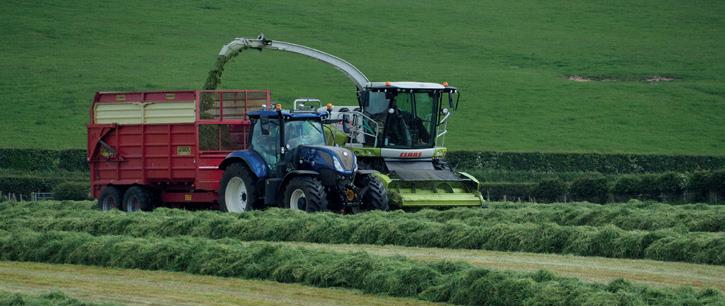


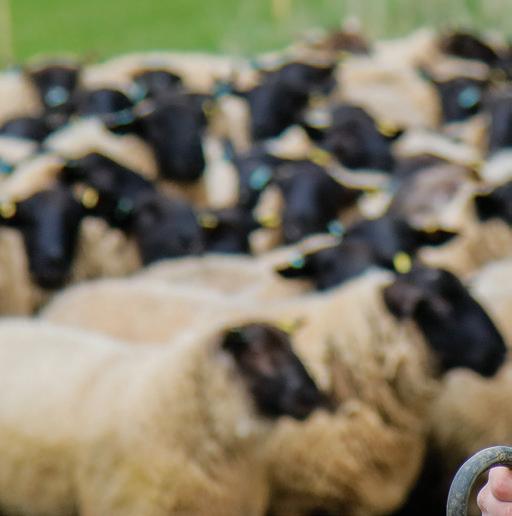



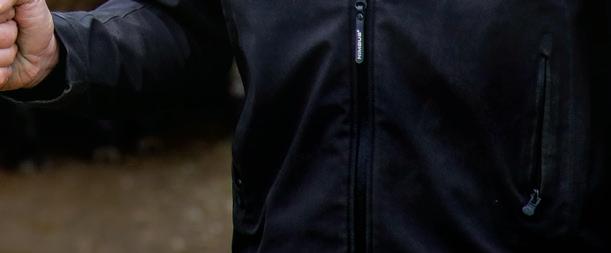







References: 1. The production costs of anthelmintic resistance in sheep managed within a monthly preventive drench program I.A. Sutherland, J. Shaw, R.J. Shaw Veterinary Parasitology 171 (2010) 300–304.
For further information call Elanco Animal Health on +44 (0) 1256 353131 or write to Elanco UK AH Limited, Bartley Way, Bartley Wood Business Park, Hook RG27 9XA. ZOLVIX™ 25 mg/ml oral solution for sheep contains monepantel. Legal category: POM-VPS in UK. Information regarding the side effects, precautions, warnings and contraindications can be found in product packaging and leaflets; further information can also be found in the Summary of Product Characteristics. Advice should be sought from the medicine prescriber. Zolvix, Elanco and the diagonal bar logo are trademarks of Elanco or its affiliates. Use Medicines Responsibly (www.noah.co.uk/responsible). ©




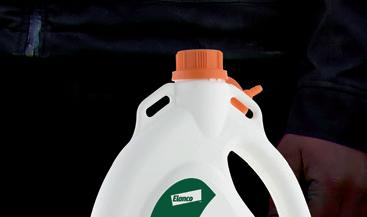



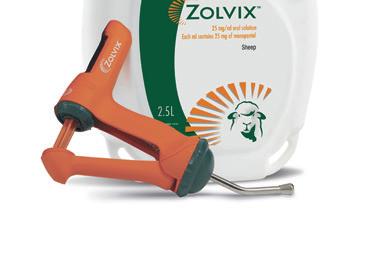

HIGHLAND




REGIONAL MANAGER
Ian Wilson
07775 915 988
ian.wilson
@nfus.org.uk
As always anything that you think NFU Scotland can be of assistance to you please get in touch.
With harvest almost up on us we’ll soon find out if the challenges of getting crop in the ground last autumn and spring were worth it. We’ll know if yields are better than expected and also if the prices achieved are good enough to deliver some profi t. Similarly we will soon know if the store buyers of lamb will remember the high prices that finished lambs were making in the spring and put a good bit of that value back to the store producers which will in turn help retain breeding ewes in our hills and uplands.
Following the General Election, the process of engaging with our new and existing MPs is underway. We’re inviting them, all along with our MSPs, to come into our stand at the Black Isle Show, as well as other events to ensure that we get a good working relationship with all parties through this period of change. Hopefully as many members as possible will have taken, or will take, time to come onto the Union and Mutual stands
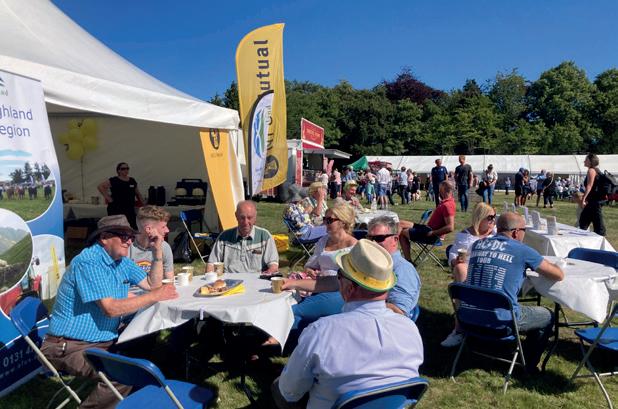
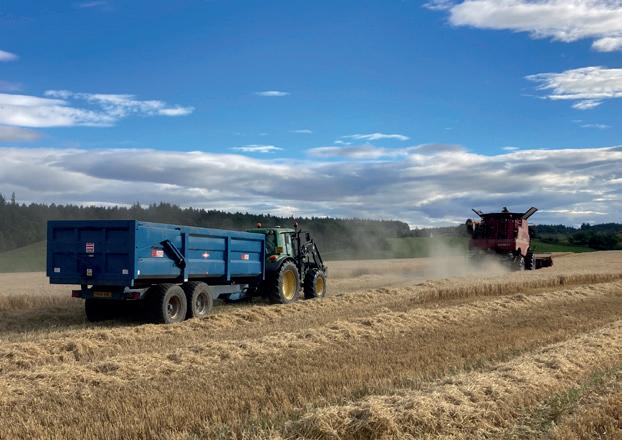
at the local shows for a catch up about all the good and bad that is happening. The shows provide great opportunities to get out and about, chat to others and get some positive endorphins into us all.
We’ve had a few good Regional Board discussions recently on the following topics – species management/introductions, future payments, funding, beef calf scheme, slaughter capacity,
replacement scheme for LFASS, maltsters, land reform and utilities to mention a few. With the sheer geography of the Highlands and Islands, we find that our members are impacted by many policies relating to these topics and keep challenging any that are not helpful to our sector. We will always ensure we push for outcomes in your favour and that will deliver a positive future.
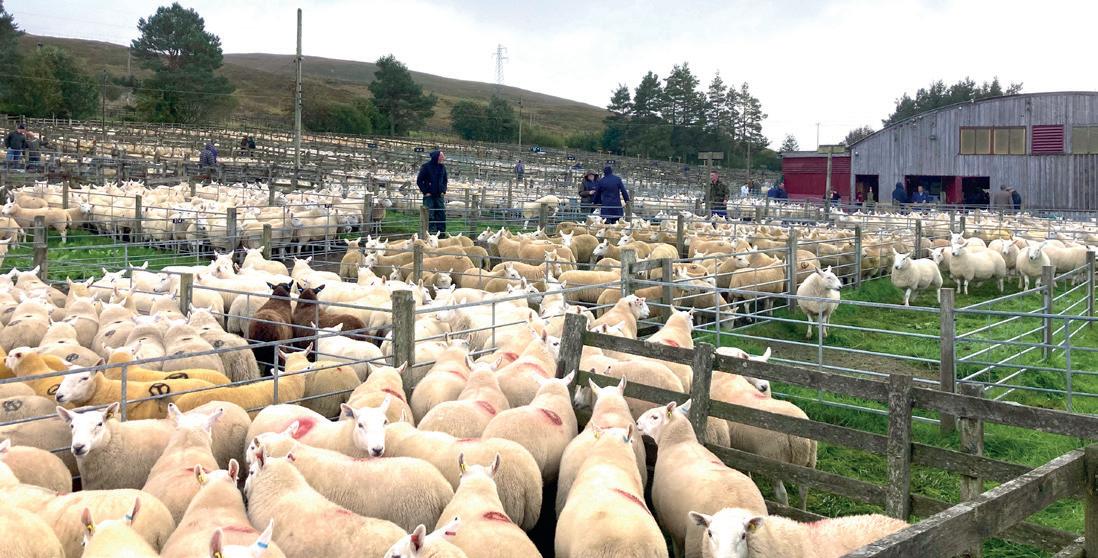




REGIONAL MANAGER
Mhairi Dawson
07718 425 053
mhairi.dawson @nfus.org.uk




REGIONAL MANAGER
Sheena Foster
07789 796 582
sheena.foster @nfus.org.uk
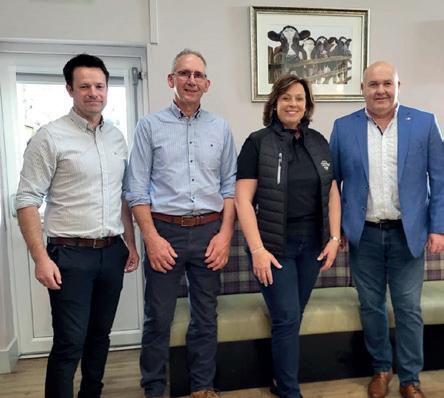

‘South Ayrshire’ and ‘Cumnock and Failford’ Branches hosted a very informative and interesting panel night at The Coo Shed on 29 May. The panel consisted of Alan Blackwood (Auldhouseburn), John Andrew (Rowanston), Alison Kerr (South Corton) and Kevin Lawrie (Myremill), all ably chaired by David Morton (Auchinbay). With over 50 members in attendance,

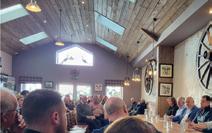


the panel answered a huge range of questions from the audience and a very interesting debate was had. Thank you very much to Alison and Willie Kerr for hosting us.




REGIONAL MANAGER
Kate Maitland
07919 001 23
kate.maitland@ nfus.org.uk
In last month’s issue members’ were reminded to be vigilant when it came to on-farm security. This came on the back of NFU Mutual (NFUM) and the National Rural Crime Unit (NRCU) recently issuing a security alert following recent spate of Global Positioning System (GPS). Intel suggests farmers previously targeted in the last two years are being repeat victims. The Scottish Partnership Against Rural Crime are urging farmers to take all possible steps to protect their GPS equipment, such as removing them from tractors, combines and other machines where safe to do
With the Ag Bill and Land Reform Bill currently in key stages Ayrshire members, Gordon Walker, Colin Mair, David Morton and Drew Kennedy joined Regional Chair John Kerr in a round table discussion with Elena Whitham MSP and Brian Whittle MSP. Other issues highlighted were Fly-tipping, Rural Crime and workforce shortage.
A very enjoyable afternoon was had by all at the recent South Ayrshire monitor farm summer meeting courtesy of hosts John and David Andrew. Now a year into the programme, discussions focused on direction for the livestock enterprises and on grassland management. Of course, the $64,000 question was asked… “Do we grow barley or buy it?” If anyone has a crystal ball for the barley price, that would be really handy! David Whiteford of Maxwelston Farm near Dailly also gave us a great overview of just how possible change is comparing his system in 2018 compared to 2023! The “Thrill at Blair Hill” event was polished off with time to chat over a BBQ and some excellent cakes from The Coo Shed.
NFU Mutual GPS Security Guide:
• Activate PIN security on GPS kit with your own unique number if available.
so and lock them somewhere securely when not in use. Forensically marking, painting, or scratching your farm name or post code onto the GPS to make them less attractive to thieves and harder to sell on.
The NFUM and NRCU have been working with manufacturers and Government to seek improved security and new legislation that will make the theft of machinery and GPS units harder. This new law will hopefully be announced later this year.
• Mark your postcode on the unit’s case to deter thieves and trace your property back to you.
• Keep tractors and combines with GPS fi tted stored out of sight when possible.
• Remove GPS kit, when possible, from tractors and other machinery and store it securely when not in use.
• Record serial numbers and photograph your kit.
• Check serial numbers of second-hand kit offered for sale.
For those that are in the Fife area please contact Emma Fisher or Fife Partnership Against Rural Crime regarding the availability of Selecta DNA Kits. Contact details can be sought from myself.
LOTHIAN & BORDERS




REGIONAL MANAGER
Lindsay Brown 07780 441 750 lindsay.brown @nfus.org.uk
Monday 5 August Netherurd Home Farm, Blyth Bridge 1.30pm. Find out how the Adamson family run their farm. Store cattle –sheep – integrated trees and all the different ways they are helping to improve the environmental credentials of the farm. Sign up to come and join us. https://Netherurd.eventbrite.co.uk or call Lindsay 07780 411750
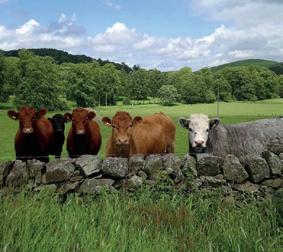
A group of Lothians’ members recently enjoyed a trip to the Scottish Parliament which started with a tour around the building. We met with several MSPs some who joined us in meeting rooms as we moved around and others whom stopped to talk to us in the corridors. We then went into the chamber and listened to a Rural Questions session. Thank you to Emma Harper who sponsored our visit and helped us pull the visit together.
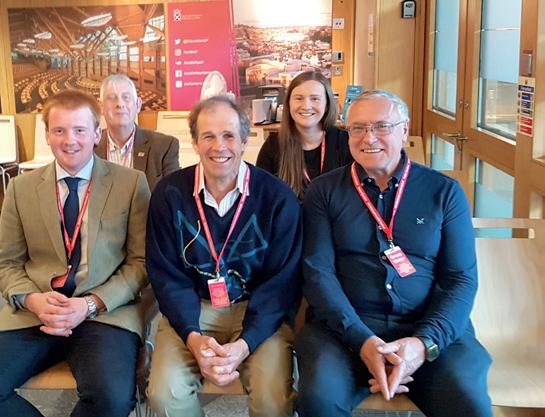

Preston Hall Farms held a very successful Open Farm Sunday event, to which over 1500 visitors came to see the machinery and animals and go on a farm walk. Visitors also had the opportunity to meet RHET, Go Rural and Moredum representatives who each had a stand at the event. It was a beautiful day, and everyone was also able to enjoy the gardens and catering trucks. Congratulations to the Callander Family and farm manager Bill Gray who organised it all.




REGIONAL
POLICY ADVISOR
John Laughton
01856 872 048
john_laughton @nfus.org.uk
I’m writing this during the week after the Royal Highland Show and what a show it was! It was blessed with good weather which makes a huge difference and does lift the spirits. Talking of spirits, the general mood was good considering the continued uncertainty the industry is facing and the bad weather which plagued the first half of the year and we all had to endure. The show was a great time to relax and socialise and it was great to see so many Orkney members there. Huge congratulations to all Orkney livestock exhibitors for fl ying the Orkney flag – every exhibitor came home with a prize rosette which makes all the hard work and effort well worth it. There was also an excellent representation of Orkney producers in the food and drink hall. Focus and attention now turns to the local shows at the beginning of August.
By the time you sit down and read this article the General Election will have been and gone and the political landscape forecast to be very diff erent. We have had good engagement with the local Orkney and Shetland candidates in the lead up to the General Election and have been impressed with their knowledge of local and national issues. We have been discussing not only the NFUS Manifesto asks and highlighting the need for multi-annual funding and more cash going into the agriculture budget, but also local issues such as the potential new abattoir, Orkney Cheese and their need for more milk, new entrants/succession, ferries, housing... the list is endless!! We’ll be engaging with the successful candidates and all party representatives as we move on beyond the election.
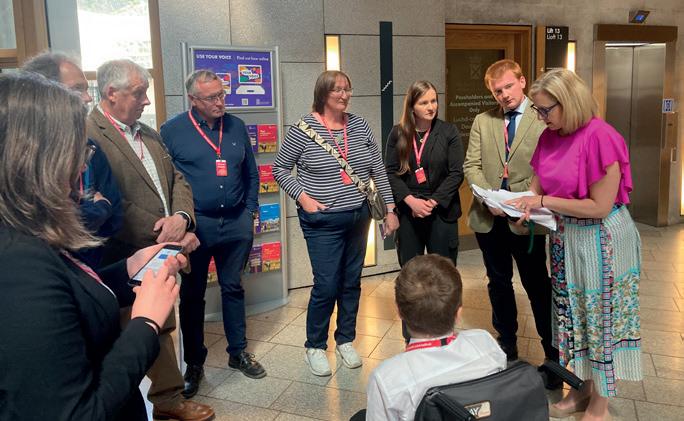
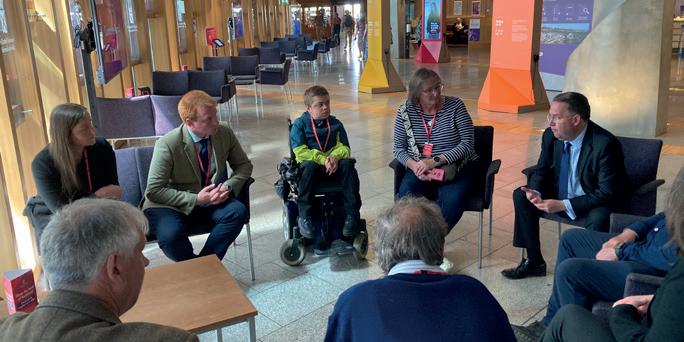

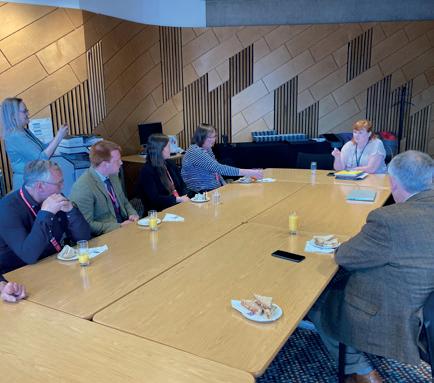



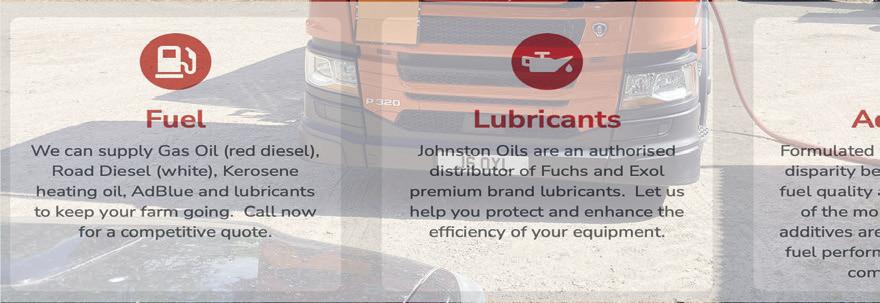
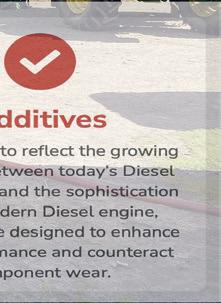






REGIONAL MANAGER
Mhairi Dawson 07718 425 053
mhairi.dawson @nfus.org.uk
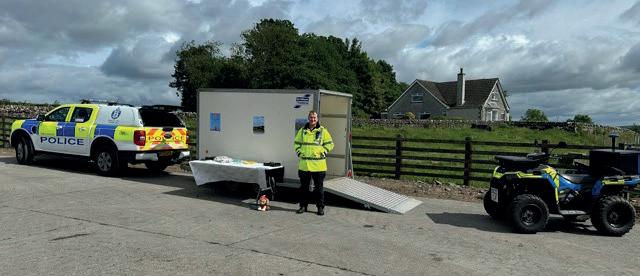
We supported two Open Farm Sunday events this year at Tarbreoch and Ernespie farms in partnership with Dumfries and Galloway Partnership against Rural Crime (DGPARC) and the DG Outdoor Access Trust (DGOAT). Thanks must go to PC John Cowan and PC Stephen Glendinning (DGPARC) and Peter Ross (DGOAT) who manned the two events. We were able to share our message about safe, responsible Countryside access to over 600 people who attended both farms. We focused on livestock worrying, keeping dogs on a lead and picking up dog poo.
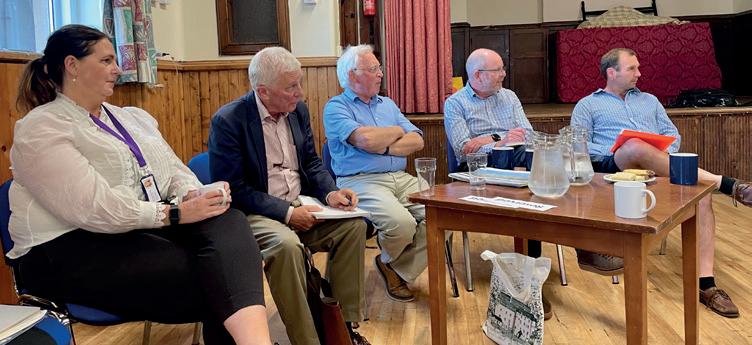
We were invited to attend a meeting hosted by Borgue Community to discuss the proposed National Park. Regional Chair, Stewart Wyllie, spoke in a panel with representatives from the Galloway & Southern Ayrshire Biosphere, Galloway
National Park Association (GNPA) and Loreburn Housing Association to put across the concerns and views of much of our membership. The absence of the GNPA Chair, a Borgue resident, was noted by many of those who attended.



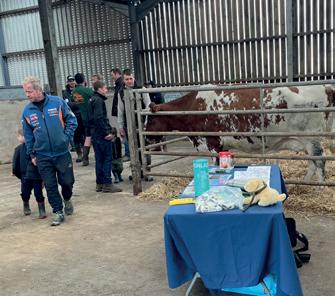
The Missing Lynx Project agreed to meet Langholm Branch members on 1 July. We were able to put across our signifi cant concerns about a predator reintroduction and highlighted how signifi cantly diff erent our way of sheep farming (and farming in general) is compared to the countries used as examples. Their fi nal consultation event is in Moff at Town Hall (15-18 August) and we ask as many members as possible to attend. You can also complete their survey online at: www.smartsurvey.co.uk/s/ TheMissingLynxProject/
Arecent Road Traffic Collision (RTC) in Argyll resulted in lengthy closure of the A83 and two HGVs carrying livestock being held up for several hours due to having no alternative route. We met with senior Police Scotland (PS) officers to discuss out concerns about the welfare of the animals in such situations. PS have provided us with the following information, which we would ask members to consider.
“When dealing with a Serious RTC the police officer in charge will likely be a Senior Investigating officer (SIO) or Police Incident Officer (PIO). Both roles have differing responsibilities, however, both take into account the welfare of the wider community involved in the subsequent road closures,




REGIONAL MANAGER
Sheena Foster
07789 796 582
sheena.foster @nfus.org.uk
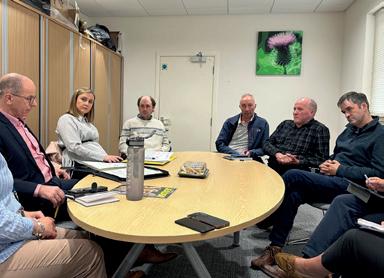
Forth & Clyde Region was pleased to welcome Màiri McAllan MSP for Clydesdale and Minister for Agriculture and Connectivity, Jim Fairlie MSP, to the NFU Mutual offi ce at Lanark Market.
The Ministers met with Clydesdale Branch members Tom French, Ian Renwick, Kenny Lang, Group Secretary Nigel Power and Union staff prior to a Q&A session where local farmers were welcome to attend. At both sessions, Land Reform, Rural Crime, Fly-tipping, the Scottish Suckler Beef Support Scheme, and Scotland’s commitment to reducing emissions were all discussed.
This was a great opportunity for members to engage and highlight concerns within the industry.
including the consideration of livestock.
“In the immediate aftermath of an RTC the PIO/SIO has several priority actions to ensure the preservation of life for those involved, creating a safe area for other emergency responders to work in and securing the scene for evidence. Police investigation work into serious and fatal collisions requires a road to be closed for, on average, between fi ve and eight hours. Where no suitable diversion exists for HGVs with livestock, every effort will be made to allow them to pass through a road closure. This will take time, as relevant evidence must be recorded/ photographed before it can be cleared,

Members of the NFU Mutual, Bearsden and Stirling offi ce have been busy out and about at their local Shows, supporting Drymen, Campsie, Stirling and Doune and Dunblane so far and it’s been great to meet and speak to those who have visited the stand.
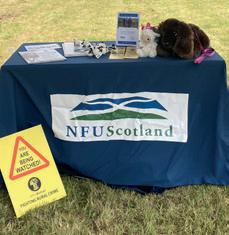

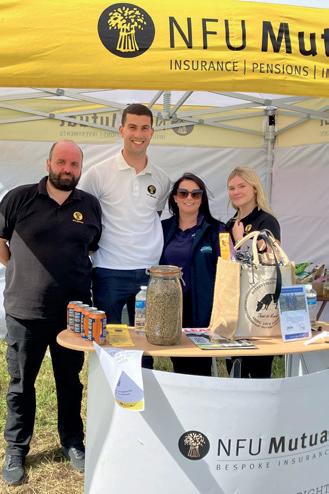
A great day was had at Overton Farm, Crossford supporting the Young family with Open Farm Sunday. It was a fantastic event with something for all. Members of the public were given a warm welcome and were taken on farm tours, and shown butchery, milking and baling demos and some tractors. I was there raising awareness on responsible Countryside access and the importance of keeping your dog on a lead.
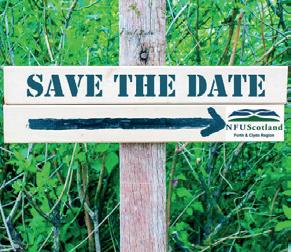
and in some cases, it may not be possible to facilitate passage until this is complete.
“Drivers should engage with the PIO/SIO, via an officer at the road closure or via the PS control room (tel. 101), to discuss the welfare needs of the livestock, and to understand timescales involved. Where passage can’t be facilitated this will also allow alternative arrangements to be considered. The PIO/SIO may not be able to speak with the haulier as soon as they attend at the closure, due to competing demands, but all are trained to consider the needs of hauliers in these circumstances.”
The annual Stockjudging will take place on Friday 9 August at Wester Lochdrum, Bonnybridge by kind permission of the Denholm family.
More information will be making its way to you but make sure to save the date in your diary as its sure to be a great night!
Do you want to enable a strong successful future for your business?
Argyll and the Islands members will have the opportunity to hear from a panel of leading industry experts for an online seminar, taking place on 26 August at 7.30pm, on how to make succession work for farmers and crofters. If you would like further information or to book for the event, please email me.




REGIONAL MANAGER
Lorna
Paterson
07786 860 453 lorna.paterson @nfus.org.uk
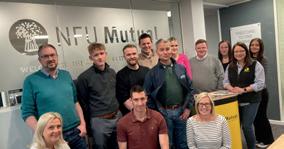
A wee visit to Thainstone offi ce on a Friday afternoon gave me the opportunity to catch up with many of the hard-working NFU Mutual and Union staff there. Our Group Secretaries were busy organising recruitment activities and Tommy was busy with Chair, Andy Smith arranging a Stockjudging & BBQ charity fundraising event at Bogentassie Farm, Lumphanan for 17 August. This will be a fantastic evening –watch out for more details.


REGIONAL


07554 741 030 lee.smith@nfus.org.uk

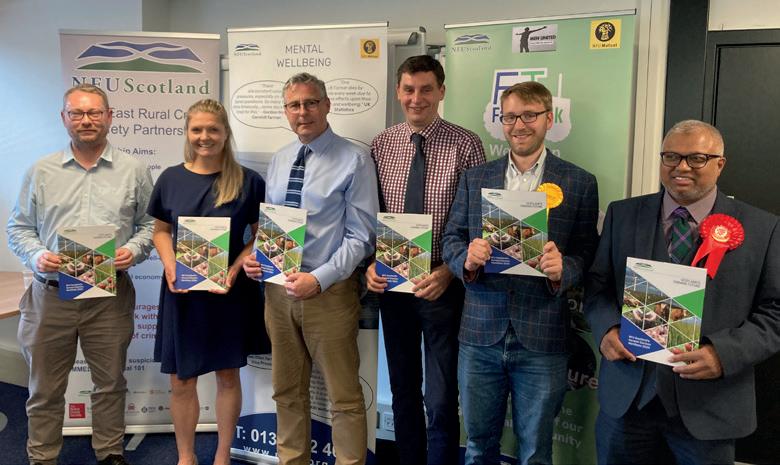
In the absence of North East Chair, Kevin Gilbert, who was allegedly abroad on a “agri-study tour”, our two Vice-Chairs, Danny Skinner and David Greer rose to the challenge and hosted our Hustings meeting in Thainstone. We chose one of the driest and least windy afternoons to host this event, and therefore our farmer audience was rather depleted. That said, the quality in the room, both in terms of audience and MP candidates was top drawer. The discussions and conversations were extremely high quality and covered some very valid issues, most especially taxation related. Thanks to members of the media Katrina MacArthur (Press & Journal) and John Sleigh (Scottish Farmer) for their attendance and their subsequent press coverage.
Open Farm Sunday proved to be a very enjoyable and sometimes challenging event with the weather not quite behaving as well as we would have liked. At least the wind kept the rain away. The staff at Seafield Estates did a fabulous job before, during and after the event. Our audience and volunteer farmers were all smashing and seemed to enjoy a thoroughly successful day at Bogton Farm, Portsoy. Special thank you to David

Greer and his management team, Mike and Susan Shand, for the enormous time and effort they invested in making our event the success it was.

Shetland celebrated LEAF Open Farm Sunday (OFS) 2024 and it did not disappoint. Aimee, Kirsty and Helen Budge hosted this year’s popular attraction at their farm in Bigton. Every year the popularity of OFS grows. People from all over Shetland travelled to Bigton to learn more about farming, the animals, machinery, feed and hard work that goes into running a working farm.
Teamwork makes the dreamwork. Aimee, Kirsty and Helen had the event planned
down to a tee, knowing what the public wanted to see and what kind of information they would like to learn about. To help them prepare and help them out on the day, NFUS Shetland Branch Chair Cecil and I attended along with members, friends and some Shetland Young Farmers. It was super seeing everyone pull together to make their day such a successful one.
The stars of the show were of course the caddies, pigs and sheepdogs!

After months and months of planning and preparation, when the date for the 2024 National Sheep Association’s Scotsheep event came (Tuesday 5 June), organisers, exhibitors, visitors, and hosts - the Hamilton family, were not disappointed. Aikengall farm near Dunbar looked stunning and offered something for everyone in the packed programme for the day.
Several representatives from NFU Scotland were among those attending the event and the Union had a stand, in Building Four, which saw a steady stream of visitors stop for a chat with Regional Managers Lindsay Brown, Mhairi Dawson and Sheena Foster, as well as Lothian and Borders Regional Chair James PlayfairHannay, and James Buchanan. CEO John Davidson, Vice-President Andrew Connon were also in attendance, as well as local secretaries, and members NFU Scotland’s Communications team.
Throughout the day, Union staff took the opportunity to participate in Scotsheep’s various planned events, seminars and demonstrations, including shearing and farm tours. Provided you were able to withstand the cold easterly wind and occasional heavy downpours, views seen on the well organised farm tours around Aikengall were unmissable and worth the wait in the queue. Hardy



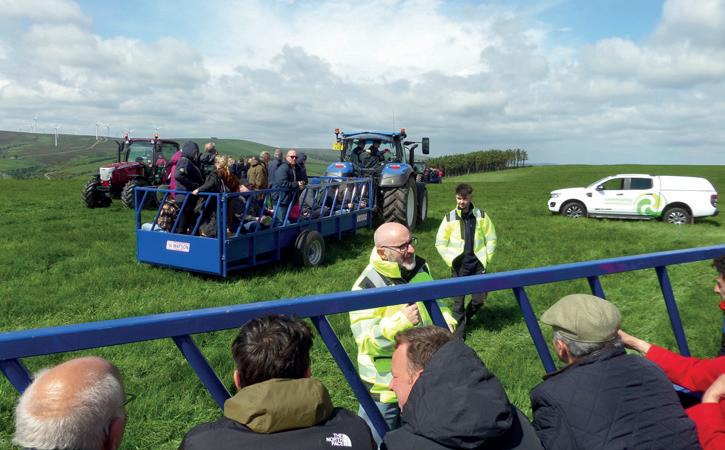
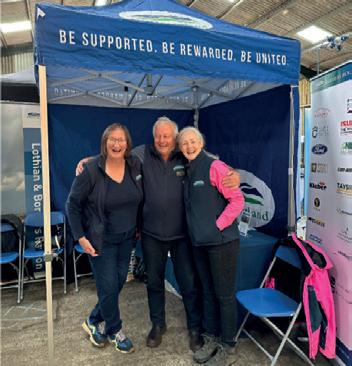
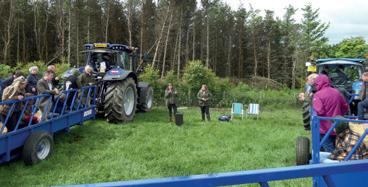

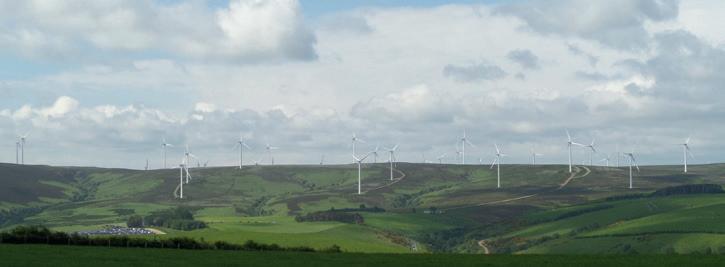

souls positioned at various spots of the elevated high pasture, provided excellent commentary of what and how the Hamilton family have adapted their crops, seeds and grazing practises to best suit the harsh environment and challenging gradients. It was the perfect day to appreciate why their investment in a community wind farm scheme was effective. The team from key event sponsors, Community Windpower Ltd., greeted tours on one of the most exposed and windy part of the tour. They explained that while the Hamilton’s core business was farming a flock of 1400 Blackface ewes and 900 suckler cows as well as 1400 Scotch Mules at their nearby Nunraw, they have a keen interest in treating their surrounding environment as an equal enterprise and as such host a 16-turbine site which is leased to Community Windpower. Commissioned
in 2009, together with two nearby sites the wind farms generate nearly 200MW of renewable energy – enough electricity to power more than 140,000 homes and displace around 135,000 tonnes of carbon dioxide each and every year.
The event also provided a perfect opportunity for hundreds of school children to get an insight into the sheep industry via RHET organised trips and promoting their ‘Journey of Food, Sheep and Wool project’ which included helping event attendees understand stock judging better.
The positive buzz and engagement on the day was evident everywhere you turned. Congratulations to NSA (Scottish Region) and the Hamilton family for hosting this year’s event to such a high standard. Everyone’s already looking forward to the next Scotsheep event in 2026.



Early international experience

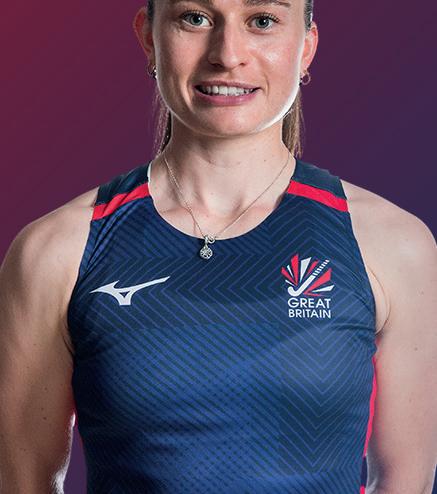
The UEFA European Football Championships 2024 will seem a distant memory for some, but few will forget the positive impact the Tartan Army had on those it encountered before, during and after Scotland crashed out of the tournament at the end of the group stage. Fortunately, Scotland excels at lots of other sports on a global stage with many of its worldclass athletes coming from farming backgrounds.
One such athlete, is hockey player, Katie Robertson, who hails from Lathrisk Farm, Freuchie. Katie will be a key part of Scotland’s team taking part in European Championship Qualifiers in late August, in Glasgow. But Katie’s first experience of competing at an international level had come when she was younger. To find out more about Katie’s journey from the fields of Fife to global hockey stage, I caught up with her in late May.
“I grew up on Lathrisk Farm, Freuchie, Fife with my Mum, Dad and older brother” Said Katie. “We’ve beef, arable and veg. Growing up I always helped out, mainly with the cattle and especially at harvest time when it was all hands to the helm. I seemed to always be given the job of pairing up the bales. While not the most exciting of jobs it was quite satisfying in the end. My brother is on the farm fulltime now along with my parents, and I still help out when I can.
“I was a member of Bellbaxter Young Farmers’ club but left when Covid came. It was always good fun and great way to keep in touch with others.”
“When we were young, my brother James and I were into horses. We showed and got into jumping in quite a big way. It was something our parents and grandparents were always encouraging of we took part in local agriculture shows as well as the bigger events like the Royal Highland Show. We knew a lot about the sport as a family and just embraced it.”
In 2010, aged 14 years, Katie was part of the winning Great Britain ‘children on horses’ team at the European Championships in Paris. Soon after this success however her equestrian career came to a crushing end due to a nasty accident.
“It was a rotational fall, so the horse fell on top of me, and I was crushed between the horse and the ground…I was very lucky to only come away with a broken shoulder and collarbone and quite a bad concussion,” explained Katie. “They thought I was going to be paralysed. It was a long recovery with being in a spinal board and neck brace, so it wasn’t very nice for my parents. I decided that I wasn’t going to get back on a horse again.”
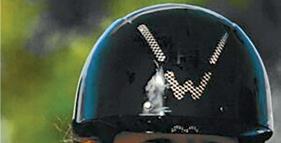
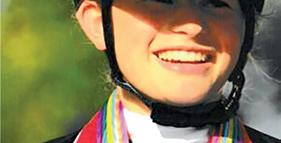


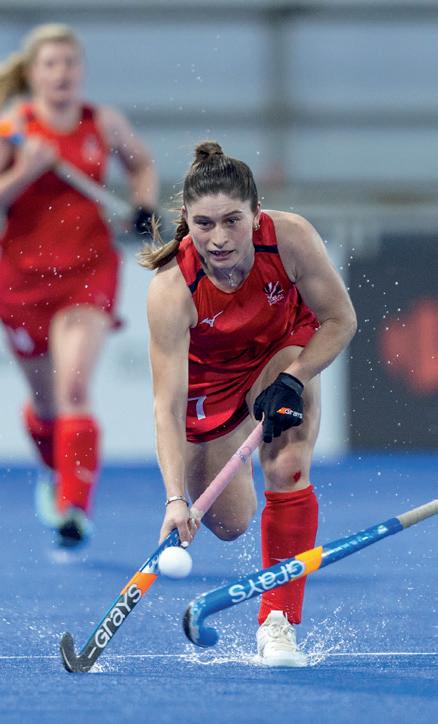
Having played hockey in PE at Kilgraston School in the neighbouring county of Perth and Kinross, Katie quickly took to the sport and found a new home for her competitive nature to run wild and was quickly making waves in the junior Scotland scene.

As hockey strayed away from the family roots, Katie craved a role model and there was none better on offer than former-Great Britain captain, Pauline Stott MBE (pictured below) who’d amazed her at first sight. “I remember when school
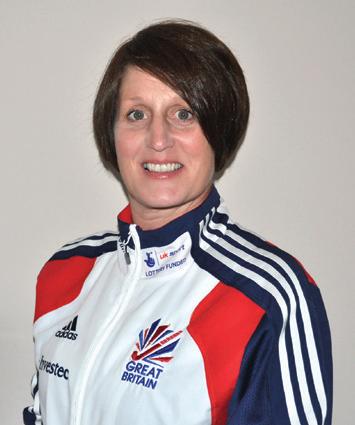
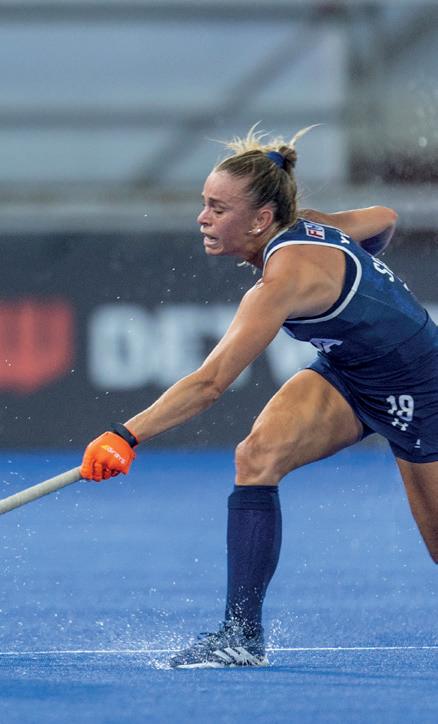
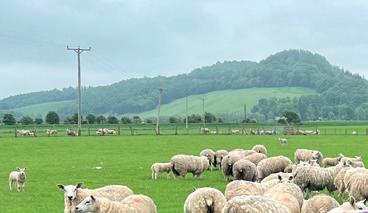
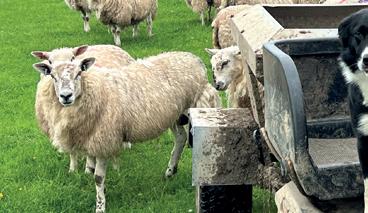

Growing up I always helped out, mainly with the cattle and especially at harvest time when it was all hands to the helm.
first announced she was coming to be a PE teacher and she came into school in her GB jacket and I looked up to her and thought ‘wow, she’s amazing’,” Katie said.
The double Olympian was Head of Sport at Kilgraston and nurtured Katie’s talent at the school, whilst helping her on the club scene taking her to training in Dundee when she joined Grove Menzieshill HC.
“I was able to play with Pauline regularly and I probably wouldn’t be playing hockey if it wasn’t for the school and Pauline,” explained Katie.
To be honest, I am not sure whether Katie was that impressed or not that I had played hockey with Pauline too back in the day. While only at club level, I too can say I’ve had an Olympian playing in my
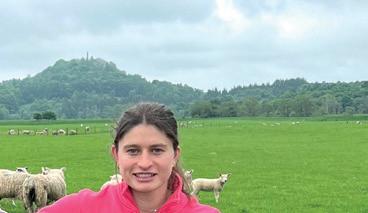
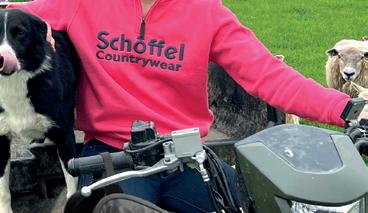


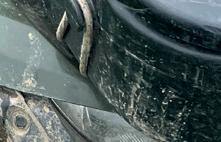
team! I do agree though that Pauline and her husband David are inspiring and have nurtured lots of Scottish hockey talent over the years. She received a welldeserved MBE for her services to hockey and sport in Scotland in 2016.
With the support from Pauline and her family, Katie worked her way through the Scottish junior ranks before travelling across the world to the Gold Coast for the 2018 Commonwealth Games with Scotland where the team finished seventh.
“After the 2018 Commonwealth Games, I was juggling teaching, studying for my degree and hockey and it was all too much. I didn’t have enough hours in the day to do what was needed. I wasn’t able to give hockey everything and my degree everything, so something had to give. I needed to focus on my career. I decide that hockey was the thing that needed to go and ‘retired’.
“But I really missed hockey and playing with my teammates. So, after a year, full of eagerness and determination, I returned to hockey fi eld and re-joined the Scottish programme, only to have the COVID-19 pandemic limit progress. But on the other hand, it enabled me to get back on top of my personal fi tness, so I was ready to hit the ground running post pandemic. I made it to the Commonwealth Games in Birmingham in 2022 as vice-captain and we fi nished sixth.”
At that time Katie was mixing a teaching job in Dollar, playing hockey and working on her boyfriend’s farm, Carse of Trowan, Crieff. But to make dreams of making the GB squad a reality, she uprooted in April 2023 and moved to London where she is based now. It paid off as she was successfully selected for the GB squad and has played in numerous fi xtures since.
“The training schedule is intense. We do three weeks training as a squad with one day off each week. I really love the whole team aspect of the game. I’ve
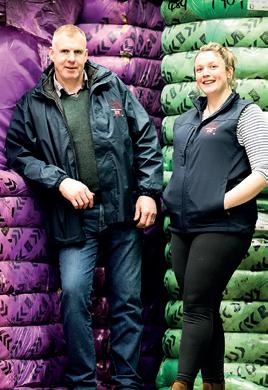


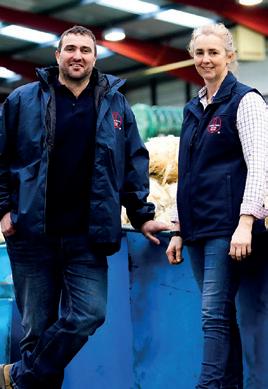














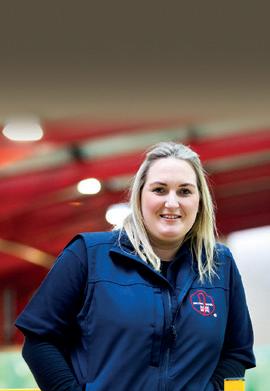
providing a convenient service for all UK sheep farmers.


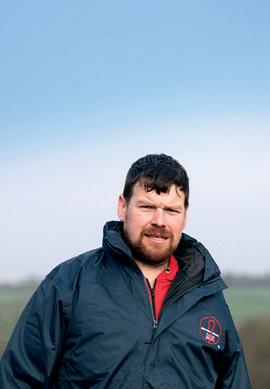
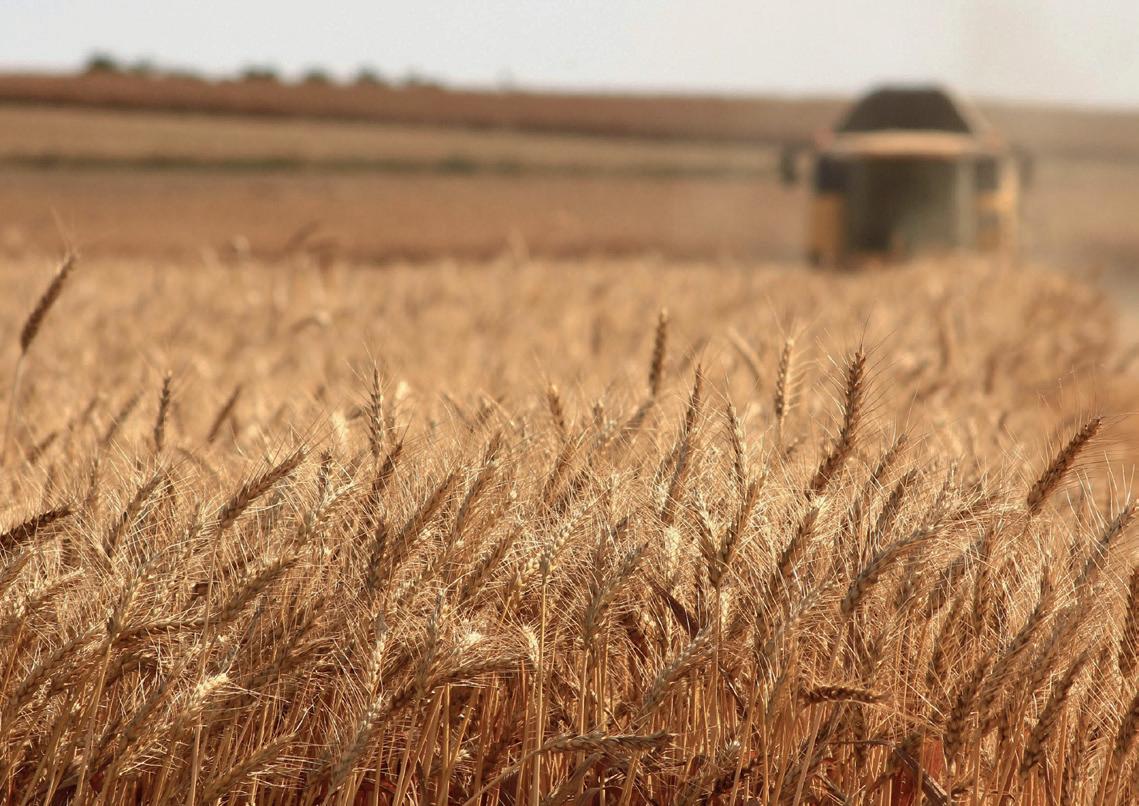

made so many new friends and it’s a real privilege playing and socialising with the best players we have. We all support each other. It’s a brilliant job to have. I use my ‘week off ’ (week four of the cycle) to come back to the farm near Crieff and help out with the sheep. We’ve just fi nished lambing. When ‘home’ I still train but it’s on an individual fi tness basis. It’s a great balance and I’ve a lot
Olympics. Devasted does not describe this news, but Katie is not one to sit back and relax and is surrounded by friends and family to rally round her in times of need. Typical of farming and crofting communities across the country.
Resilient at her core, she has been back helping out on the farm in Crieff, maintaining her fi tness and training hard with the Scottish team ahead of
of support from my boyfriend Glen and my family. The fact he, Glen, was himself a successful international competitor (one of the Muirhead curling dynasty) helps. He knows what commitment is involved and the highs and lows of being an elite athlete can be.”
One of those crushing ‘lows’ came in June this year when Katie was not selected to go forward as one of the GB representatives to compete in Paris
the European Qualifi ers in August. She’ll play a key role for team Scotland when they face Austria, Croatia, Czech Republic, Lithuania, and Wales over an intense four days of competition at the National Hockey Centre, Glasgow.
Good luck Katie and thank you for your time and willingness to share your journey so far. It’s super to hear that your passion for farming still plays an important factor in your life.
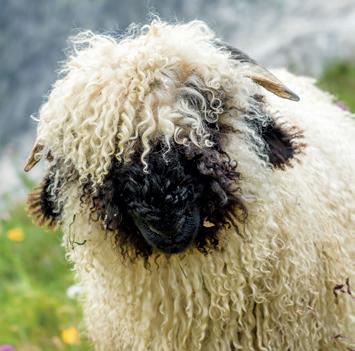
Fun quick questions/answers
What do you do to relax?
“Walk the dog or go for a coff ee with friends.”
Favourite meal or food type?
“I like to cook – I’m not very good but I try. I like Scotch Lamb.”
What’s your favourite sheep breed?
“Oh I’d better say Belties to keep Glen (boyfriend) happy. But if I had a choice, I’d say Valais Blacknose.”
What sort of music do you listen to pre-match to get your mind set?
“Personally, I would pick Skerryvore. It reminds me of Scotland and fi res me up for a game.”
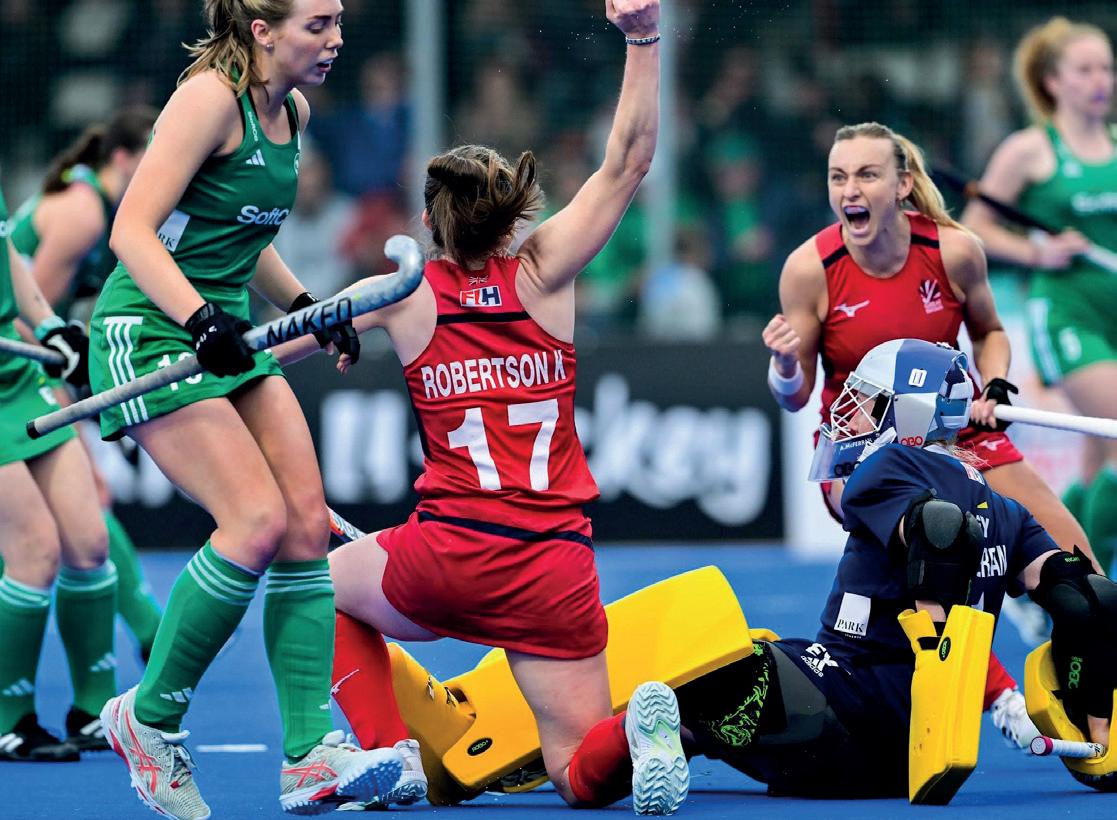

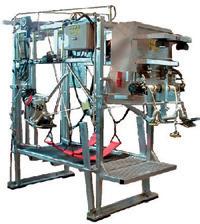



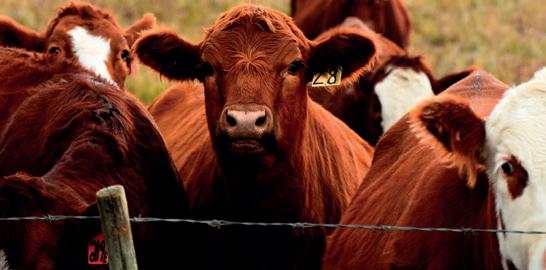










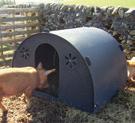
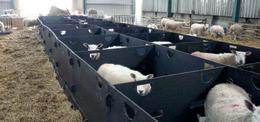
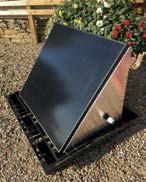

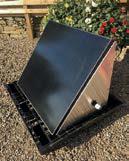

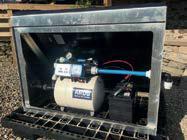
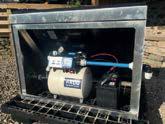

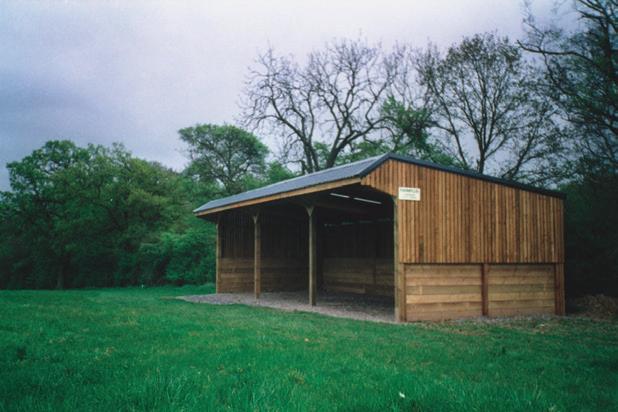




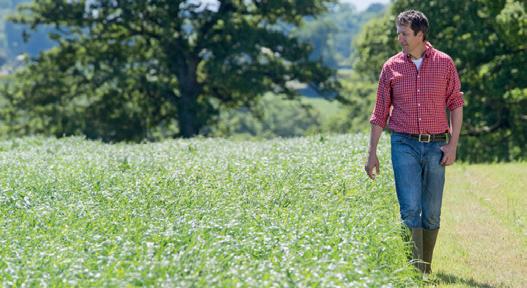
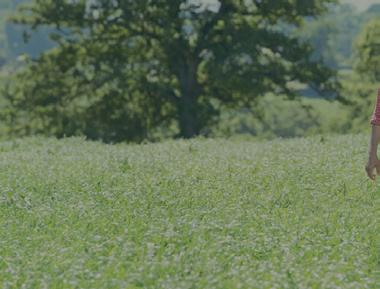



We have worked with farms, estates and forestry managers across Scotland and North of England for over 15 years. We supply both old heritage varieties of trees and more mainstream varieties suitable for Scottish growing conditions. We advise on planting fruit as part of farm diversification and ecotourism, as well as cider and juice making.
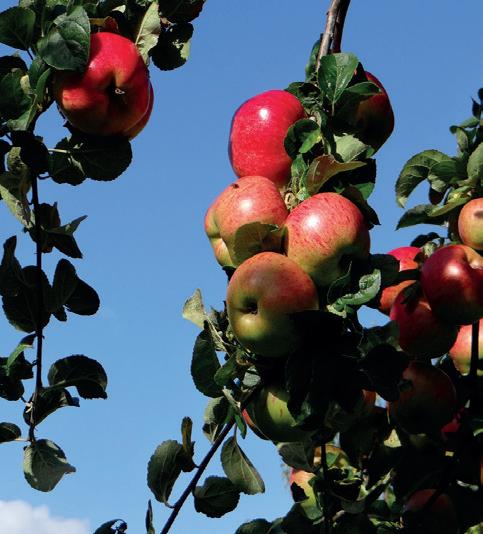
are suppliers of finest Scottish fruit and nut trees, soft fruit, hedging for farms and estates with wholesale prices available for larger orders Our consultancy services includes orchard design, advice on ground preparation, selection of varieties, planting services We carry out orchard maintenance and train people in orchard skills












